STANLEY KUBRICK'S Full Metal Jacket
Shot-by-Shot Analysis
Part One

Go to TOC for this film ( (which has also a statement on purpose and manner of analysis and a disclaimer as to caveat emptor and my knowing anything authoritatively, which I do not, but I do try to not know earnestly, with some discretion, and considerable thought).
TOC and Supplemental Posts | Part 1 | Part 2 | Part 3 | Part 4 | Part 5 | Part 6 | Part 7 | Part 8 | Films Home
LINKS TO SECTIONS OF THE ANALYSIS ON THIS PAGE:
Hello Vietnam, Shots 1 through 21
Choke Yourself, Shots 22 through 52
What Side was that?, Shots 53 through 60
Tonight, You Pukes will Sleep with your Rifles, Shots 61 through 76
The Obstacle Course, Shots 77 through 95
Do You Believe in the Virgin Mary, Shots 96 through 105
1 - A WARNER COMMUNICATIONS COMPANY (00:00)
The film opens with titles and the song, Hello Vietnam, released August of1965. The Country tune, by Tom Hall, sung by Johnny Wright and his wife, Kitty Wells, was pro-war in a time when pop and alternative music was anti-war. For three weeks it was #1 on American Billboard Hot Country Singles and Tracks, charting for 20 weeks. Patriotism and call of country taking precedence over personal life and loves, the song was timely as it was in 1965 that the United States dramatically increased its presence in Vietnam, the Army and Marines beginning ground operations in March of that year. The film's action in Vietnam takes place in 1968, the first scene in Da Nang being prior the breaking of the Tết Truce on January 30th, 1968. However, Joker's boot camp training takes place in December, which would be December of 1966, and one would have other training after boot camp, including staging, preparation for going to Vietnam. In Gustav Hasford's The Short-timers, on which Full Metal Jacket is based, the graduation section informs that after boot camp Joker goes to Infantry Training and then Basic Military Journalism School at Fort Benjamin Harrison, Indiana.
The lyrics we will hear while the hair of fresh Marine recruits is shaved are...
Kiss me goodbye and write me while I'm gone
Goodbye my sweetheart, hello Vietnam
America has heard the bugle call
And you know it involves us one and all
I don't suppose that war will ever end
There's fighting that will break us up again.
Goodbye my darling, hello Vietnam
A hill to take a battle to be won
Kiss me goodbye and write me while I'm gone
Goodbye my sweetheart, hello Vietnam.
Kubrick cuts away from the song before it goes into its message that communism must be stopped "in that land" or "our freedom will start slipping through our hands" . The focus thus stays with a couple broken apart by what seems like never-ending war. This may presage how part of the film's focus, as with in the book, is the partnering of the Marine with his "female" gun in boot camp so it becomes his primary relationship, the Marine told that he is married to his rifle.
2 A STANLEY KUBRICK Film (00:10)
3 FULL METAL JACKET (00:14)
4 A young man whose head is being shaved by a barber. (00:17)
5 Lawrence's head being shaved. (00:21)
6 A young man whose head is being shaved. (00:25)
7 A young man whose head is being shaved. (00:29)
8 Joker's head being shaved by the same barber who will shave Cowboy's. (00:33)
9 A young man whose head is being shaved. (00:37)
10 A young man whose head is being shaved. (00:40)
11 A young man whose head is being shaved. (00:44)
If we can judge the the rings, the same Black barber shaves 7, 8, 9, 12, 14 and 15. If we can judge by the rings, there appear to be two White barbers, one of whom wears a wedding ring.
12 A young man whose head is being shaved. We have this time a glimpse of the Black barber's face. (00:48)
13 A young man whose head is being shaved by a barber. This time we have a glimpse of the White barber's face. (00:52)
14 A young man whose head is being shaved. (00:56)
15 Cowboy's head is being shaved. (01:00)
16 A young man whose head is being shaved. (01:04)
17 A young man whose head is being shaved. (01:07)
18 A young man whose head is being shaved. (01:11)
19 A young man whose head is being shaved. . (01:15)
20 A young man's head being shaved. His gaze meets the camera. (01:20)
21 Shot of the floor filling with hair at the base of the barber's chair. (01:25)
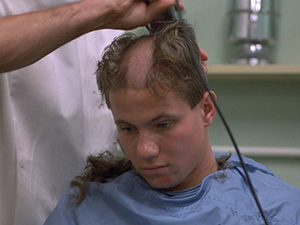 4 |
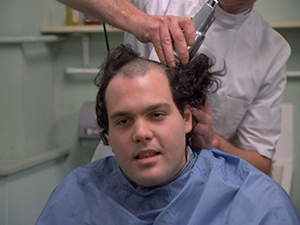 5 |
 6 |
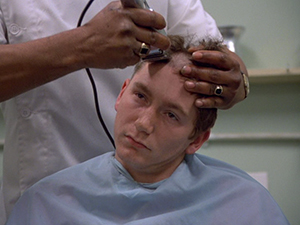 7 |
 8 |
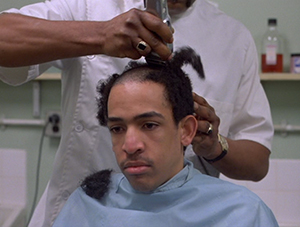 9 |
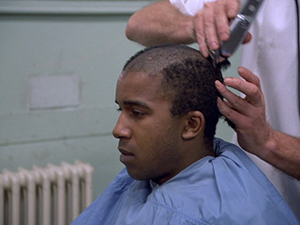 10 |
 11 |
 12 |
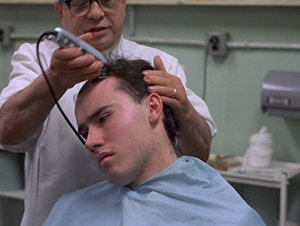 13 |
 14 |
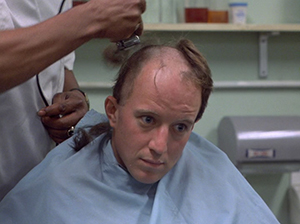 15 |
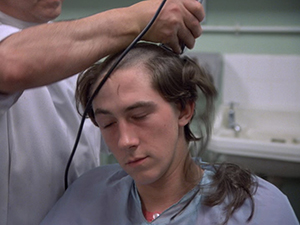 16 |
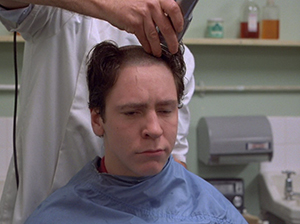 17 |
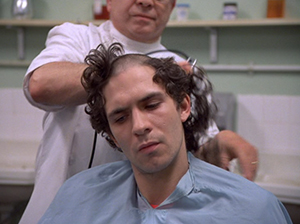 18 |
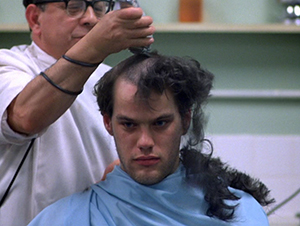 19 |
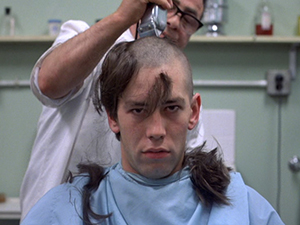 20 |
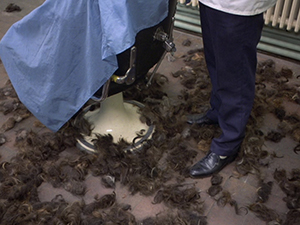 21 |
With my first viewing of Full Metal Jacket, when it was released, I was immediately carried back to 1970 as I watched the credits play over the shaving of the heads of the boots (new Marines). This scene recalled Tribes, a made-for-television movie in which Jan-Michael Vincent plays Adrian, an anti-war free spirit, opposite Darren McGavin as Sgt. Thomas Drake, the tough drill instructor whose task is to whip Adrian into Marine Corps shape. I was familiar with the film as I was a pre-teen in 1970, and Tribes had the appropriate promo that had me sure to be seated before the television when it was aired, and hopeful that my parents wouldn't elect to watch another show. I only saw Tribes once but the shearing of the locks scene in it was immediately recalled, having made a deep impression. In 1987, many who saw Full Metal Jacket were going to remember Tribes because it was aired on prime time television and 1987 was just short a generation removed from 1970, which meant Tribes was part of the shared experience of viewers from at least a couple of generations. But the shaving of hair, upon entering the military, is, or was, a common association with loss of freedom and individuality. Even Gomer Pyle, in the Marine Corps television comedy that ran 1964 to 1969, had his hair shaved on camera. Therefore, the shearing of the hair alone might not be cause for mentioning Tribes, but there are other comparisons to be made as well, between Tribes and Full Metal Jacket, some of which are found in the book, The Short-timers, Gustav Hasford's novel on which Full Metal Jacket was based.

In Tribes, not just one person's head was shaved while the credits ran, but several, as with in Full Metal Jacket, and Tribes as well concluded that scene with a shot of the floor around the barber chairs filling up with hair.
The barber with the glasses who shaves Adrian's hair in Tribes even looks similar to the barber with glasses in Full Metal Jacket, as if Kubrick might have deliberately made this choice rather than it being happenstance.

I can guarantee you that almost no pre-teen girl watching Tribes in 1970 didn't shed a tear when Vincent's hair was shorn. I was one of them. At the time, long hair was generally representative of a mindset against the system, against war, and the shaving of it was the first outward, physical step in dissociating a person from that identity. For a male to have grown their hair to any length, they had to find a way to negotiate relatively strict high school dress codes, dress codes at work, insults on the street, and even threats of physical harm, so a kind of gauntlet had already been run, and was now to be erased, so that one couldn't be immediately distinguished from conservative hawks. Though we cried, not wanting Adrian to be reformed into a killer, and because he had a kind of surfer glamor to him that went the way of his locks, we should have caught that while his head was being shaved music intended to vaguely call to mind meditative practice was being played, and we could have thus associated the shaving also with the nude heads of Buddhist monks. Aside from his reflecting on pleasing memories of sexual encounters, the defining feature of Adrian is that he practices meditation, and this meditative practice is what threatens the system.
Adrian, during the film, does experience crisis in response to his boot camp training, but he remains true to his anti-war ethics. He and the drill instructor are in a constant state of struggle. Adrian's meditative practice having an influence on his fellow recruits, the sergeant repeatedly attempts to disrupt especially his meditative practice to which Adrian credits his resilience, stamina, and self control, enabling him to withstand the physical and emotional strain of boot camp. A fledgling bridge is established between Adrian and the drill instructor, concerning the practice of meditation, when Adrian compares it to the instructor's drawing of a bird in flight. Both are freeing, contemplative acts.
The drill instructor's superior, Master Sgt. Frank DePayster, takes a profound dislike to Adrian, and rather than graduating him out of boot camp, as Thomas has approved, busts Adrian back to a motivational platoon under him. When Adrian deserts, Frank tells Thomas that he had always warned he was wasting his time on Adrian. The audience is intended to realize that the time was not wasted for Adrian had instead influenced Thomas.
There are other comparisons to be made to Tribes that show Kubrick was certainly referring to it. The part of Pyle recalls a recruit named Quentin, in Tribes, who, like Pyle, accidentally rests his gun against his wrong shoulder and is called out for not appearing to know his left from his right. Eventually, like Pyle, the stress of being targeted is too much for him. Whereas Joker finds Pyle in the bathroom arming his rifle, and Pyle kills the drill instructor and then himself, in Tribes, Adrian finds Quentin in the bathroom, he having slashed his wrists. The drill instructor demands the platoon read a book that describes how to slash wrists correctly, so that everyone's time won't be wasted. That night, finally overwhelmed with emotion, Adrian pounds his bunk in frustration, taking out his rage for the Sergeant, and the other recruits follow suit, Adrian having become their leader. Instead, in Full Metal Jacket, Kubrick has everyone, in the quiet of night, pound Pyle with a bar of soap wrapped in a towel, the platoon taking out the their frustrations on him as they are being punished for his ineptitude. This causes the crucial turn in which Pyle loses all faith in his fellow human beings, his peers, and begins to transform into the killer who will ultimately murder the Sergeant then himself.
I'll explore these things further in their respective scenes. The Short-TImers does have in it the episode in which Pyle is beaten with soap, and it also has in it a description of a man, Perkins, who attempted suicide and while the blood was being mopped up the drill instructor called the platoon together to scoff at the attempt and describe the correct way of cutting one's wrists, using the vertical slash as opposed to the horizontal. This is what happens in Tribes, and I don't know whether it's just pure coincidence or...I wouldn't even call it plagiarism...but instances of Gustav reiterating bits of storyline in Tribes that he may have considered critical to Marine Corps boot experience. However, the book doesn't have in it a description of recruits having their heads shaved, and that Kubrick begins Full Metal Jacket with it occurring under the credits, so clearly recalling Tribes, makes me wonder if he was intentionally establishing a connection between Tribes, The Short-timers, and Full Metal Jacket.
Tribes derives its title from a conversation in which Adrian tells the drill sergeant that they simply belong to different tribes. When the action of Full Metal Jacket moves to Vietnam, Kubrick makes a clear correspondance between the Vietnamese and American Indians, which would be another reason for his having perhaps made a fairly direct reference to Tribes, by simple virtue of that film's title.
Directed by Joseph Sargent, written by Tracy Keenan Wynn (his father, Keenan Wynn, played Colonel "Bat" Guano in Kubrick's Dr. Strangelove) and Marvin Schwartz, Tribes was itself a loose remake of the 1957 film, The D.I., directed by and starring Jack Webb as the D.I., written by James Lee Barrett, who had served in the Marines during WWII. In that movie, Adrian's counterpart is Pvt. Owens, who enlisted but is then desperate to get out of the Marines. His tough D.I., Jim Moore, sees his potential and that he is perhaps the most intelligent man in his platoon, so though frustrated with Owens he insists on not giving up on him, which is much the same situation as with Adrian. Both have D.I.s who we are to understand are assholes for the good of the recruits and with whom we're supposed to be ultimately sympathetic. In The D.I. Owens is also a Pyle character as his failings keep getting him in trouble with the rest of the platoon, creating unnecessary work for them, which they resent. But whereas in The D.I. various recruits are berated for being overweight or unable to know their left from their right, Pyle is burdened with the congregate of failures. Just as with Tribes, in which the D.I. has a superior who pesters him about Adrian and then doesn't graduate him, in The D.I., Moore is pestered by others who see Owens as a lost cause, and his Captain eventually determines that discharging Owens is the only recourse--a difference is that in Tribes the D.I.'s superior is conspicuously sadistic, whereas in The D.I. there is no bad part to the Marines except that Jack Webb needs to learn how to have a romantic relationship and carry his work attitude home with him a little less. In The D.I., toward the end, Moore finds Owens about to go "over the hill", preparing to make an almost certainly fatal night swim through the swamp to escape Parris Island, and he persuades him to not do so and doesn't turn him in. In Tribes as well, the D.I. finds Adrian at a bus station, about to go "over the hill", and he persuades him not to do so (however Adrian will desert later). Whereas the 1950s had Owens as the promising child who is unable to finish anything, and his mother shows up at the Marine base to demand that he not be kicked out (that's a twisted scene) and demand that the Marines make a man out of him, 1970 had Adrian as the promising genius of a boot draftee who wants out because of a conflict in ethics.
The 1957 movie eventually revealed a back story in which Owens had a Marine Corps Captain for a father, and two older brothers who had become Marines. All three had died in battle. The viewer comes to understand that this is part of Owens' problem, that he psychologically can't live up to those sacrifices. The toughest Marine of all turns out to be his mother, who not only is willing to give up a husband and two sons to the Marines, she is determined that her last son, Owens, be "broken" into being a warrior Marine as well. She tells the Captain that her husband would reach his breaking point, then grin, and she'd wait for that grin, knowing afterward that everything would be alright. When Owens finally grins, we are supposed to see this as his "breaking point", and an inner change is somehow effected that makes it possible for him to wholly submit and become a Marine. That's hard core, and is a plot point that none of the subsequent boot camp films replicates.Tribes instead turns Adrian's past into a blur of probably no parental expectations, he having dropped out of high school and a dedicated wanderer since then. Gustav gave his Joker and Cowboy backgrounds but reserved exploration of them for The Phantom Blooper. Kubrick does his usual thing and provides zero background for his characters in Full Metal Jacket.
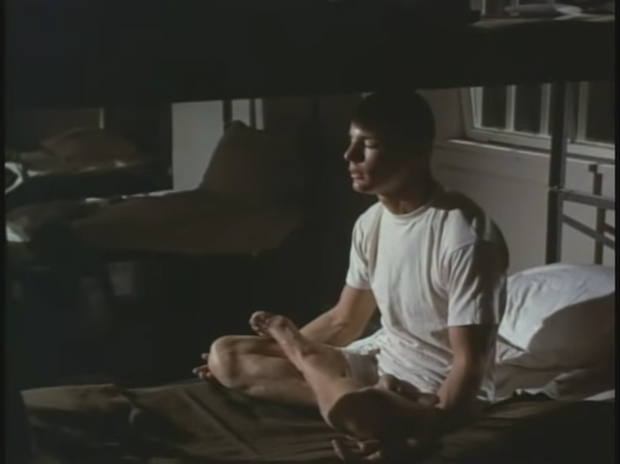
We observe, above, Adrian meditating in Tribes. I have wondered if the reframing of Owen not just into a "hippy", but a spiritual hippy whose meditative practice threatens the system, and who can rather remind of a monk with his shaved head, might have been partly inspired by the famous protest of monks against the Vietnamese War who set themselves on fire, the most well-known being perhaps Thich Quang Duc, 11 June of 1964. As shown below, his protest was pictured as reverenced in a framed photo in the anti-war documentary of 1966, Time of the Locust.
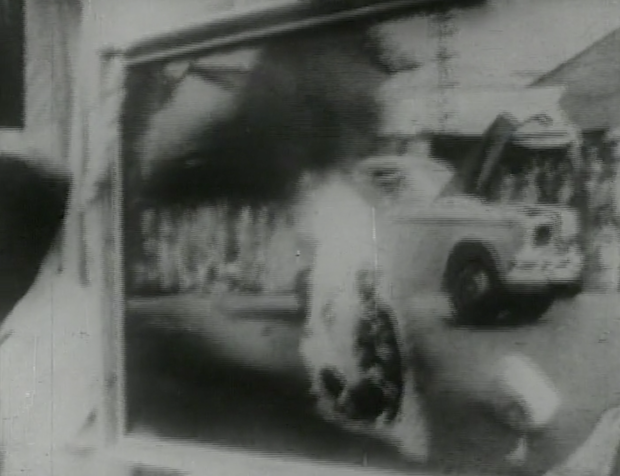
Just as I've watched Tribes twice over, in reparation for this analysis, I've also watched The D.I. twice, because both of those films provided a lof DNA for Hasford's The Short-timers, and so too do they make their way into Kubrick's Full Metal Jacket as part of its DNA. These, as well as other films referenced, were cultural artifacts that had already shaped public knowledge about the Marine Corps and what it is to be shaped into a Marine Corps warrior, a "brotherhood" just as willing to kill as to die. Interviews with Marine Corps veterans have them almost universally relating the same stories about Marine Corps boot camp, and though the harshest abuses suffered in boot camp have lightened up in recent decades, a mentality that fosters it still exists. A boot camp that wanted to be notorious for being harsh, that wanted to be feared, would want to draw to individuals who, for various reasons, were attracted to this, but there are stories of many who had no idea what they were getting themselves into, and during the draft they had no choice. The D.I. makes it clear that Owens had chosen the Marines. Tribes instead has Adrian a draftee. Full Metal Jacket doesn't disclose how Joker, Pyle, and Cowboy came to be in the Marine Corps, whether drafted or enlisted.
22 Marine barracks, identified as #7, white number on red background. The floor is terra cotta red, the columns of the squad bay are a light green, and the walls are white. The recruits, shaved and in their new fatigues, stand before their racks. The drill instructor, the back door behind him, strides along them, toward the camera. Joker and Cowboy are the 15th and 16th men observed in that row of 20, and Pyle is the 19th. On the left screen, they are on the starboard side of the barracks, which is the right, as shown by this designation on the columns, whereas port is the left. (01:28)
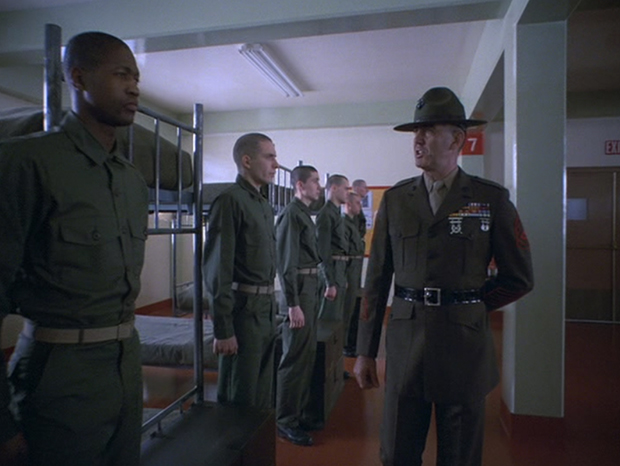
HARTMAN:
I am Gunnery Sergeant Hartman, your senior drill instructor. From now on, you will speak only when spoken to, and the first and last words out of your filthy sewers will be "sir." Do you maggots understand that?
RECRUITS: Sir, yes, sir.
HARTMAN:
Bullshit. I can't hear you. Sound off like you got a pair.
RECRUITS: Sir, yes, sir!
HARTMAN (passing Cowboy and Joker who are the 15th and 16th recruits): If you ladies leave my island, if you survive recruit training, you will be a weapon. You will be a minister of death praying for war, but until that day, you are pukes.

He passes Pyle who is the 19th out of 20 in that row, then turns to cross the room and go down the other side.
HARTMAN: You are the lowest form of life on Earth. You are not even human fucking beings. You are nothing but unorganized, grabasstic pieces of amphibian shit. Because I am hard, you will not like me, but the more you hate me, the more you will learn. I am hard but I am fair. There is no racial bigotry here. I do not look down on niggers, kikes, wops or greasers. Here, you are all equally worthless, and my orders are to weed out all non-hackers who do not pack the gear to serve in my beloved Corps. Do you maggots understand that?
RECRUITS: Sir, yes, sir!
HARTMAN: Bullshit. I can't hear you.
RECRUITS: Sir, yes, sir!
HARTMAN (stops at the 16th recruit down who is African-American): What's your name, scumbag?
SNOWBALL: Sir, Private Brown, sir!
23 Medium 3/4 shot of Hartman from the right of Snowball. (2:40)
HARTMAN: Bullshit. From now on you're Private Snowball. Do you like that name?
24 CU of Snowball from Hartman's left shoulder. (2:44)
SNOWBALL: Sir, yes, sir!
25 Medium 3/4 shot of Hartman from the right of Snowball, as in 23. (2:46)
HARTMAN: Well, there's one thing that you won't like, Snowball, they don't serve fried chicken and watermelon on a daily basis...
26 Medium profile shot of Private Joker. (2:50)
HARTMAN (off screen): .. in my mess hall.
SNOWBALL (off screen): Sir, yes, sir!
JOKER: Is that you, John Wayne? Is this me?
27 Long shot of Hartman as he emerges from behind a column to cross the room and approach Cowboy and joker. (2:57)
HARTMAN: Who said that? Who the fuck said that? Who's the slimy little communist-shit, twinkle-toed cocksucker down here who just signed his own death warrant? Nobody, huh? The fairy fucking godmother said it. Out-fucking-standing. I will P.T. you all until you fucking die. I'll P.T. you until your assholes are sucking...
28 Medium profile shot of Hartman in front of Cowboy, just a slight shift from shot 27. (3:18)
HARTMAN:
... buttermilk. Was it you, you scroungy little fuck? (Grabs Cowboy by the collar.)
COWBOY: Sir, no, sir.
HARTMAN: You piece of shit. You look like a fucking worm. I'll bet it was you.
COWBOY: Sir, no, sir.
JOKER: Sir, I said it, sir.
HARTMAN: Well, no shit. What have we got here? A fucking comedian. Private Joker. I admire your honesty. Hell, I like you. You can come over to my house and fuck my sister.
29 Shot of Joker and Hartman from behind Hartman as he punches Joker in the stomach. (3:40)
HARTMAN: You little scumbag. I've got your name. I've got your ass!
30 CU of Hartman pointing at the camera and yelling. (3:45)
HARTMAN: You will not laugh. You will not cry. You will learn by the numbers. I will teach you.
31 Return to view as in 29, Joker half kneeling on the ground with the pain of having been punched. (3:49)
HARTMAN: Now get up. Get on your feet.
Joker rises.
HARTMAN: You had best unfuck yourself...
32 Side MCU of Hartman yelling at Joker. (3:54)
HARTMAN: ...or I will unscrew your head and shit down your neck.
33 MCU of Joker from behind Hartman. (3:57)
JOKER: Sir, yes, sir!
HARTMAN: Private Joker, why did you join my Corps?
JOKER: Sir, to kill, sir.
34 MCU as in shot 32 from side of Hartman yelling at Joker. (4:01)
HARTMAN: So you're a killer?
JOKER: Sir, yes, sir.
HARTMAN: Let me see your war face.
JOKER: Sir?
HARTMAN: You've got a war face? Ahhhh! That's a war face. Now let me see your war face.
35 MCU as in shot 33 of Joker from behind Hartman. (4:10)
JOKER: AGH!!!!
HARTMAN: Bullshit. You didn't convince me. Let me see your real war face.
JOKER: ARRRGH!!!!!!!!!!!!
36 MCU as in shot 34 from side of Hartman dressing down Joker. 4:17
HARTMAN: You don't scare me. Work on it.
37 MS of Joker and Hartman from side. (4:18)
JOKER: Sir, yes, sir!
HARTMAN (advancing to Cowboy): What's your excuse?
38 MCU of Cowboy and Hartman from the side. (4:21)
COWBOY: Sir, excuse for what, sir?
HARTMAN: I'm asking the fucking questions, private. Do you understand?
COWBOY: Sir, yes, sir.
HARTMAN: Well, thank you very much. Can I be in charge for a while?
COWBOY: Sir, yes, sir.
HARTMAN: Are you shook-up? Are you nervous?
COWBOY: Sir, I am, sir.
HARTMAN: Do I make you nervous?
COWBOY: Sir...
HARTMAN: Sir what? Were you about to call me an asshole?
COWBOY: Sir, no, sir.
HARTMAN: How tall are you, private?
COWBOY:
Sir, five-nine, sir.
COWBOY: Five-foot-nine. I didn't know they stacked shit that high.
You trying to squeeze an inch in on me somewhere?
COWBOY: Sir, no, sir.
39 Shot of Hartman from behind Cowboy. (4:48)
HARTMAN: Bullshit. It looks like the best part of you ran down the crack of your mama's ass and ended up as a stain on the mattress. I think you've been cheated.
40 Profile shot of Hartman and Cowboy. (4:55)
HARTMAN:
Where the hell are you from anyway, private?
COWBOY: Sir, Texas, sir.
HARTMAN: Holy dogshit. Texas? Only steers and queers come from Texas, Private Cowboy, and you don't much look like a steer to me, so that kind of narrows it down. Do you suck dicks?
COWBOY: Sir, no, sir.
HARTMAN: Are you a peter puffer?
COWBOY: Sir, no, sir.
HARTMAN: I'll bet you're the kind of guy that would fuck a person in the ass and not even have the goddamn common courtesy to give him a reach around. I'll be watching you. (Skipping a person, he moves on to Lawrence.)
41 Profile MS of Pyle and Hartman. (5:21)
HARTMAN: Did your parents have any children that lived?
PYLE: Sir, yes, sir.
HARTMAN: I'll bet they regret that.
You're so ugly you could be a modern-art masterpiece. What's your name, fat-body?
PYLE: Sir, Leonard Lawrence, sir.
HARTMAN: Lawrence? Lawrence what, of Arabia?
PYLE: Sir, no, sir.
HARTMAN: That name sounds like royalty. Are you royalty?
PYLE: Sir, no, sir.
HARTMAN: Do you suck dicks?
PYLE: Sir, no, sir.
HARTMAN: Bullshit. I'll bet you could suck a golf ball through a garden hose.
PYLE: Sir, no, sir.
42 CU of Hartman from behind Pyle. (5:42)
HARTMAN: I don't like the name Lawrence. Only faggots and sailors are called Lawrence. From now on you're Gomer Pyle.
43 Profile view of Pyle and Hartman as in shot 41. (5:47)
PYLE: Sir, yes, sir.
HARTMAN: Do you think I'm cute, Private Pyle? Do you think I'm funny?
44 Shot of Pyle from behind Hartman. (5:51)
PYLE: Sir, no, sir.
HARTMAN: Then wipe that disgusting grin off your face.
PYLE:
Sir, yes, sir.
45 CU of Hartman from behind Pyle. (5:56)
HARTMAN:
Well, any fucking time, sweetheart.
46 Shot of Pyle from behind Hartman. (5:58)
PYLE: Sir, I'm trying, sir.
HARTMAN: Private Pyle, I'm going to give you three seconds, exactly three fucking seconds, to wipe that stupid-looking grin off your face or I will gouge out your eyeballs and skull-fuck you. One. Two. Three.
PYLE: Sir, I can't help it, sir.
HARTMAN: Bullshit. Get on your knees, scumbag.
47 Pyle drops to his knees. 6:17
HARTMAN:
Now, choke yourself.
Pyle raises his hands to his throat.
HARTMAN:
Goddamn it, with my hand, numb-nuts. Don't pull my fucking hand over there.
48 MCU of Hartman from behind Pyle. (6:27)
HARTMAN: I said, choke yourself. Now lean forward and...
49 MCU of Pyle facing Hartman's hand. (6:30)
HARTMAN: ...choke yourself.
Pyle leans forward into Hartman's hand so he may choke him.
HARTMAN:
Are you through grinning?
PYLE: Sir, yes, sir.
50 CU of Hartman yelling down at Pyle. (6:37)
HARTMAN: Bullshit. I can't hear you.
51 Pyle being choked by Hartman. (6:39)
PYLE: Sir, yes, sir.
HARTMAN: Bullshit. I still can't hear you. Sound off like you've got a pair.
PYLE: Sir, yes, sir!
HARTMAN: That's enough. Get on your feet.
52 Pyle from behind Hartman as he stands. (6:51)
HARTMAN: Private Pyle, you had best square your ass away and start shitting me Tiffany cuff links or I will definitely fuck you up.
PYLE: Sir, yes, sir!
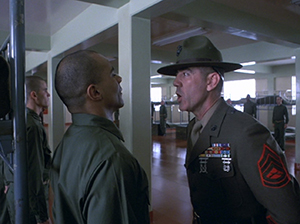 23 |
 24 |
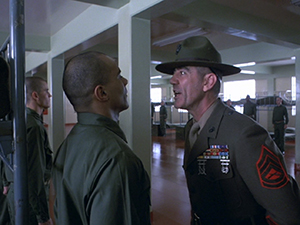 25 |
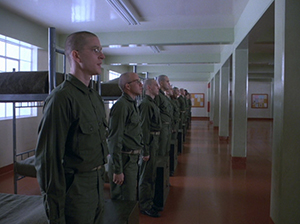 26 |
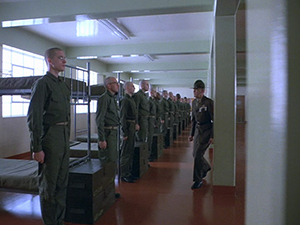 27 |
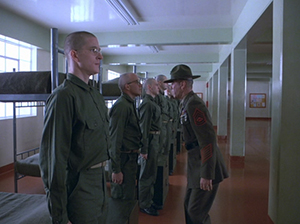 28 |
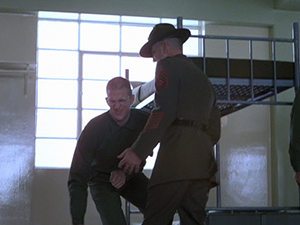 29 |
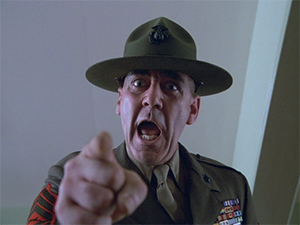 30 |
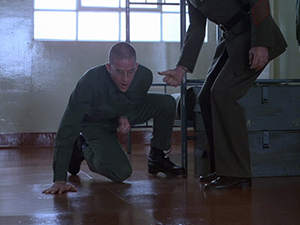 31 |
 32 |
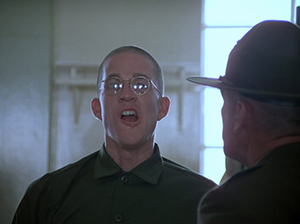 33 |
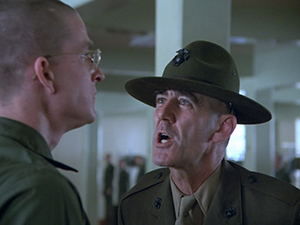 34 |
 35 |
 36 |
 37 |
 38 |
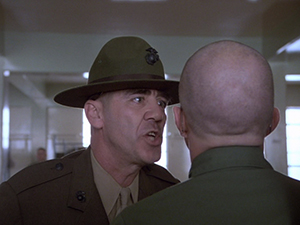 39 |
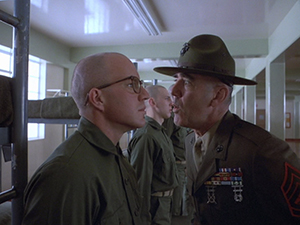 40 |
 41 |
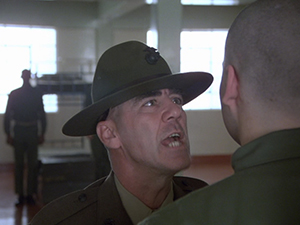 42 |
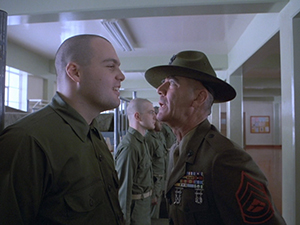 43 |
 44 |
 45 |
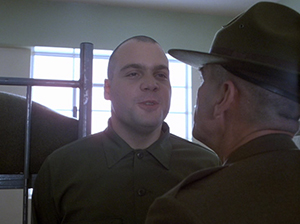 46 |
 47 |
 48 |
 49 |
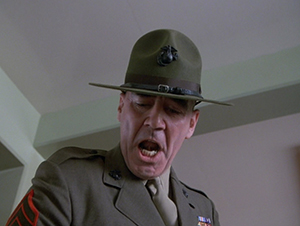 50 |
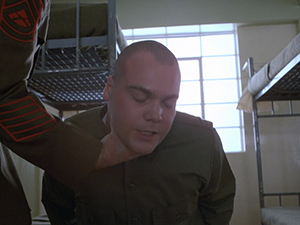 51 |
 52 |
Before getting into speaking about the film, I'm going to post a couple of videos from Youtube that show boot camp training at Parris Island. Kubrick, having communicated some of the brutality and hazing that can occur, and was par for the course in earlier decades, has, however, left out of Full Metal Jacket the overwhelming sense of chaos, focusing as he does on Hartman alone as the drill instructor, when instead there would be also assistant drill instructors piling on the recruits, so an individual might be assailed by three at a time.
However, it's interesting that though this streamlining lessens the impact of the freneticism that assails the new recruits throughout the initial weeks in which they are divorced from their prior life, reoriented so their individualism is quickly replaced with their primary identity being part of and representative of the Marine Corps who live to kill or be sacrificed on the pyres of war, the vast majority of the comments, from former Marines, on Youtube clips of Full Metal Jacket, are approving and state the film takes them back to training days. Many applaud Full Metal Jacket as being what they believe to be the best war movie of all time. With those who do comment on any differences between boot camp and the film they tend to zero in on the film not reflecting the overwhelming chaos of being harangued by the assistant D.I.s
This image is taken from a Youtube video of the old barracks that has been closed down on Parris Island, and shows that Full Metal Jacket has done a good job of recalling that physical environment.

Though the below 1970 "This is Parris Island" video footage makes it undeniably clear, for those who may not be familiar with the terrain, that coastal South Carolina is not England, where Kubrick filmed, those who trained at Parris Island tend not to remark on these differences in their comments on FMJ. Perhaps this is because they don't expect that kind of replication in a film. Perhaps it's because they're satisfied with the recreation of the emotional atmosphere of boot camp, some even remembering it fondly, which speaks to the complexity of this anti-war film, that it is appreciated by veterans who were against the war as well as for those who were not. But that there are some who, via the film, are inspired to remember boot camp fondly, may raise issues with which Gustav Hasford was concerned, such as his antagonism for Ermey's portrayal of Hartman (Gertheim in the novel), feeling he was “'a fucking pogue lifer' and a propagandist for the official Marine Corps pro-war line on Vietnam" (The Killing of Gus Hasford, Grover Lewis, LA Weekly, 1993). The term pogue/pog (person other than grunt) is a pejorative for non-infantry, individuals who serve in some kind of support capacity and don't see combat. In WWI the Marines used it as slang for a gay man. Wikipedia states by WWII it meant a trainee that didn't meet expected standards, then the meaning shifted to be in Vietnam what it is currently. Ermey, for a time, had been a D.I. in the Marines. He was in Vietnam but it was with the Marine Wing Support Group 17, so he was non-infantry, serving in support roles, and this may have been part of Hasford's problem with him. Though Kubrick was so impressed by Ermey, who had been hired as a technical adviser, that he moved him into the role of Hartman, one must wonder if there was something in Ermey's portrayal that Hasford felt sentimentalized and even made attractive the D.I., when Hasford's book describes him as fundamentally evil. Does Ermey ever really portray Hartman as evil? Though Hartman is sadistic, though he does sadistic things, Ermey's portrayal at times comes close to being a cartoon parody.
Visually, Kubrick never once reminds us that Parris Island is, indeed, an island. Yet, the film has connections to Kubrick's Fear and Desire, which made use of elements from Shakespeare's The Tempest, and Prospero's exile to an island where, simply phrased, one might say he confronted himself as the dark magician. In Fear and Desire a plane crash strands a military company of several individuals behind enemy lines. Not satisfied to simply escape, having become aware of an enemy General's encampment nearby, they determine to kill him. When Lieutenant Corby and Private Fletcher encounter the General and his Captain, they find they are facing versions of themselves, made obvious to the viewer by the actor who played Corby playing also the General, and the actor who played Fletcher playing also the Captain. Hasford has Joker experience a similar dilema in The Phantom Blooper, so that after he is taken prisoner by the North Vietnamese and has lived with them for a time, he comes to strongly identify with them and see in them his family in Alabama. But his family back in Alabama is abusive and alienated from him, and the North Vietnamese, he realizes, use him for their own purposes. Regardless, once he self-identifies with how they are alike, he can't return to the mentality of Us versus them.
The Short-Timers has bits that Kubrick expands upon to make scenes, and when it comes to making a comparison between the novel and the film, though there is much in the book that is in the film, sometimes it can seem like The Short-Timers had a scissor taken to it, carving it up, and these bits were rearranged in building the film. The novel is threaded throughout the film, and yet the film distances itself from the novel.
In the opening squad bay scene, we are introduced to the individuals who are going to be the key players throughout the Parris Island scenes: Joker, Cowboy, Pyle, and the drill instructor. We had already observed Joker, Cowboy, and Pyle in the shaving of the hair scene, but they weren't yet framed as leads, they didn't stand out. Though the film concentrates on these characters, so much of the action is communal in nature, involving the entire platoon training, that we also feel them as firmly embedded within the group. After all, they are in boot camp on this island for the purpose of becoming part of a brotherhood--and from what I've read, this remolding can be so substantial, after just a few weeks of boot camp, that it already effects a troubling separation from those outside the Marine Corps. After a few weeks of boot camp the new Marine may be surprised that they now view family, friends and the outside world in general to be disorganized, absurd, and sloppy. When the time comes to leave the Marine Corps, they can have problems reintegrating by simple virtue of Marine Corps values alone, and have to learn to relax their identification with them, and to release others from hypercritical expectations established by the Marine Corps sense of order. The movie, The D.I., did in fact address this through Jack Webb's film girlfriend (who a year later became his wife in real life).
The Marines are looking for a few good men...
The recruit says that his name is Leonard Pratt.
Gunnery Sergeant Gerheim takes one look at the skinny red-neck and immediately dubs him "Gomer Pyle."
The Short-Timers begins with Leonard Pratt being renamed as Gomer Pyle, no commentary on why really given by the D.I.. Leonard is still named Pratt in the screenplay, then is changed to Lawrence in the film. Kubrick has the D.I. describe the name "Lawrence" as gay. Faggots and sailors are called Lawrence, he says, and he doesn't like it, Hartman dubs Leonard as Gomer Pyle--and yet Jim Nabors, who played Gomer Pyle, was gay.
The origin of the name is the laurel, which was used for making Apollonian laurel-leaf crowns, so the association with royalty is on the mark. Kubrick was making an association with the name's origin, certainly, when Hartman said that it sounded like "royalty" to him.
Poor Pyle. In Full Metal Jacket his very feasibility is called into question, when Hartman first addresses him with the question, "Did your parents have any children that lived?" Just as the head-shaving scene can be taken as a nod to the film Tribes, so does this direct us to the film The D.I. in which virtually the same line appears, voiced by the D.I. when the recruits are out on "burial duty" (I think it was called), looking for a sand flea Owens had slapped away in order to bury it. What's being engrained is that the Marine only does what is ordered, and must have the self control not to bend to physical annoyances. They are told the slapping at the flea could have given them away on the battle field. (And yet they were sent into the field in Vietnam carrying cans of C-rations which, veterans pointed out, were not only bad, the cans clanked as they walked and broadcast they were there. There are many such irrationalities in the service. The primary reason for the finding of the sand flea is to make Owens' peers put the pressure on him to shape up so they aren't made to suffer for what he does.)
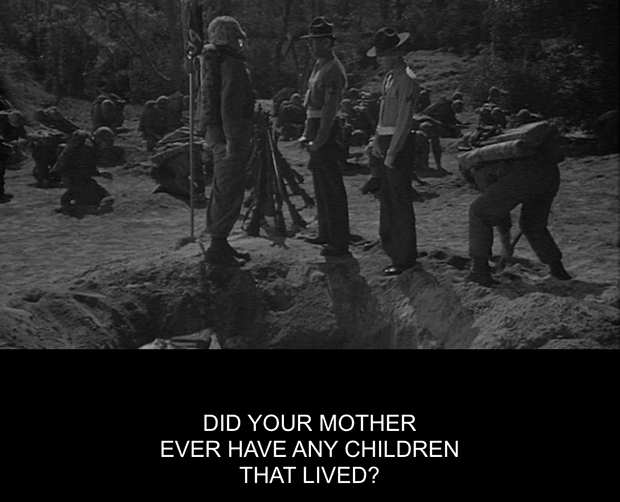
The film changes Leonard's name, and also transforms Leonard from a skinny hillbilly to an individual who is scorned for being heftier than his peers. He is, in the film, much as he is in the book, but in the book there seems a natural amiability to his character, as well as his ineptitude, that is lost in the film. This isn't to say we get to know him in the book. He's a person with no back story. As I've stated before, Kubrick gives us almost no back story for any of these characters. But there's no back story in the novel either for Pyle or Hartman, and only in The Phantom Blooper does Hasford fill us in on Joker and Cowboy. For those who land in Vietnam, a combination of genes and formative environment and the fate of personality determines how they will deal with brutal circumstance, but we are never told what it is about their "before" life that guides their actions. They simply are.
That "before" life is, however, something to be shed, annihilated by the Corps. Whatever it was no longer matters as it is being walled off as irrelevant. They are being torn down and built back up, brainwashed to be part of an obedient brotherhood of killers.
Oddly enough, coincident with their introduction, the movie intentionally confuses and mixes together the characters of Cowboy and Joker with their introduction. In the film, Hartman is bullying Brown, a Black recruit, who he gives the name of Snowball, when Joker speaks up and says, "Is that you, John Wayne? Is this me?", in a voice that mimics John Wayne, who idiosyncratically swaggered, the tough Hollywood American hero, through both Westerns and War films. This attracts attention away from Snowball so that Joker purchases significant grief for himself in his defense of Snowball.
But in the book, it is Cowboy who says, "Is that you, John Wayne? Is this me?" Then Joker, mimicking John Wayne, adds, "I think I'm going to hate this movie."
A wiry little Texan in horn-rimmed glasses the guys are already calling "Cowboy" says, "Is that you, John Wayne? Is this me?" Cowboy takes off his pearl-gray Stetson and fans his sweaty face.
I laugh. Years of high school drama classes have made me a mimic. I sound exactly like John Wayne as I say: "I think I'm going to hate this movie." Cowboy laughs. He beats his Stetson on his thigh.
Gunnery Sergeant Gerheim laughs, too. The senior drill instructor is an obscene little ogre in immaculate khaki. He aims his index finger between my eyes and says, "You. Yeah--you. Private Joker. I like you. You can come over to my house and fuck my sister." He grins. Then his face goes hard. "You little scumbag. I got your name. I got your ass. You will not laugh. You will not cry. You will learn by the numbers. I will teach you."
Leonard Pratt grins.
Sergeant Gerheim puts his fists on his hips. "If you ladies leave my island, if you survive recruit training, you will be a weapon, you will be a minister of death, praying for war. And proud. Until that day you are pukes, you are scumbags, you are the lowest form of life on Earth. You are not even human. You people are nothing but a lot of little pieces of amphibian shit."
Leonard chuckles.
"Private Pyle think I am a real funny guy. He thinks Parris Island is more fun than a sucking chest wound."
The hillbilly's face is frozen into a permanent expression of oat-fed innocence.
"You maggots are not going to have any fun here. You are not going to enjoy standing in straight lines and you are not going to enjoy massaging your own wand and you are not going to enjoy saying 'sir' to individuals you do not like. Well, ladies, that's tough titty. I will speak and you will function. Ten percent of you will not survive. Ten percent of you maggots are going to go AWOL or will try to take your own life or will break your backs on the Confidence Course or will just go plain fucking crazy. There it is. My orders are to weed out all nonhackers who do not pack the gear to serve in my beloved Corps. You will be grunts. Grunts get no slack. My recruits learn to survive without slack. Because I am hard, you will not like me. But the more you hate me, the more you will learn. Am I correct, herd?"
Some of us mumble, "Yes. Yeah. Yes, sir."
"I can't hear you, ladies."
"Yes, sir."
"I still can't hear you, ladies. SOUND OFF LIKE YOU GOT A PAIR."
"YES, SIR!"
"You piss me off. Hit the deck."
Though it's sensible that Cowboy would have voiced the John Wayne line, with its being shifted to Joker he is now exclusive to serving commentary on John Wayne's Hollywood warriors, and it may have been felt this condensing was needed in the film. This also transfers to Joker reflections on question of identity. However, there's also to be considered that in The Phantom Blooper, when Joker visits the deceased Cowboy's parents, we learn he wasn't from Texas but a Kansas "dirt farm", and Cowboy's parents now blame John Wayne and pro-war politicians for the death of their son. "John Wayne movies murdered our son," they tell Joker. This confirms Cowboy's early association with John Wayne, but Joker, in The Short-timers, is put in the position having to kill Cowboy, so John Wayne is also Joker.
The movie acknowledges that the shift of the remark has been made from Cowboy to Joker with Hartman initially believing it was Cowboy who had said it, then Joker accepting responsibility. In the novel and film, in response to Joker's mimicking the voice of John Wayne, Hartman taunts and berates Joker with false appreciation for his comedic skills, telling him, "You can come over to my house and fuck my sister." Later, in the novel, Joker says to Cowboy, "fot the hundredth time", that he wants to slip his "tube steak" in Cowboy's sister and what will he take in trade. Cowboy's jocular response is given as always being, "What do you have?" We have a version of this scene in the film as well. Finally, only in the novel, almost immediately before Cowboy's death scene, in response to Joker asking Cowboy, "If you get yourself wasted, who will introduce me to your sister?", Cowboy tells Joker, "I don't have a sister. I thought you knew that." And Cowboy doesn't have a sister, but it's difficult to tell if Joker always knew he didn't have a sister when making his tube steak joke, or if all along he has been responding to Gerheim/Hartman's having been the one to state Joker could fuck his sister--which takes us back to that identity confusion concerning the John Wayne lines. If I pay attention, it's because that one line--"Is that you, John Wayne? Is this me?"--becomes so loaded and so much is constellated around it.
The drill instructor is brutal in the novel, but he doesn't begin with punching Joker in the gut. And he doesn't force Pyle to choke himself on his hand. He instead punches Pyle in the Adam's apple, the chest, the stomach, then slaps him across the face, drawing blood, which is bad enough, but it's not the same sadistic violence as forcing Pyle to choke himself, which is a whole other level. As if to provide a softening cushion between the audience and Hartman's brutality, I've already mentioned how a comic element is added to the drill instructor by amping up his insults so they are even entertaining, which also makes them less personal, as if he has voiced these lines to every platoon he trains so there is nothing personal to it (yet there is). Though many love Ermey's portrayal, because of how entertaining he is, I could agree with Gustav, that he's too much an advertisement for the Marines, at least up to the point where Ermey's Hartman is murdered, at which point he becomes a word-of-warning anecdote.
Pyle is told to choke himself, but of course he doesn't choke himself, Hartman does it, demanding however that Pyle submit by leaning his throat into Hartman's hand. This doesn't happen in the book, and it's not in the screenplay, where Pyle is instead backhanded by Hartman across the mouth. One might be reminded of one of the mysteries in The Shining, which is who choked Danny. Regressed, sucking his thumb, the child appears in the Colorado Lounge, after Jack's nightmare, mute and with bruises on his throat. Wendy accuses Jack of choking Danny and, horrified, leaves the room with him. Jack looks perplexed, as if he has no knowledge of the event, and goes to "drink" in the Gold Room where he complains about Wendy and his misogyny is plainly revealed, as well his history of abuse and his resentment of Danny. Then Wendy finds him and relates that Danny has said a crazy lady in Room 237 choked him. Later, when Jack says he finds nothing in Room 237, he insists that Danny choked himself. Because Kubrick has Pyle adopt the same deranged stare as Jack in The Shining he has become associated with him, and rightly so. But Kubrick also has Pyle associated with Danny, choked by the D.I. and twice later made to suck his thumb, as Danny regressed to doing after he was choked. Pyle also, like Danny, becomes for a time almost catatonic, unresponsive, but whereas Danny escapes his father, Pyle, an adult, kills the father figure, his enemy, with the rifle the father figure trained him to use. The smart thing would have been to discharge him while he was still just a fuck-up, but Hartman has a point to prove, as did The Overlook and Jack who had it in mind that Danny must be controlled and disciplined for his disobedience.
It's a little thing but as Hartman moves to punch Joker in shot 28, his left fist draws back and comes in, as if he's going to punch him with his left fist, then cut to shot 29 and Hartman has punched Joker with his right fist and his left hand is open. Confusion of left and right soon becomes a focal point for bullying Pyle.
53 LS from the rear, the recruits jogging. They pass a sign reading 2nd Recruits Training Field. (7:02)
HARTMAN: Left, right, left, right, left, right, left.
Left, right, left, right, left.
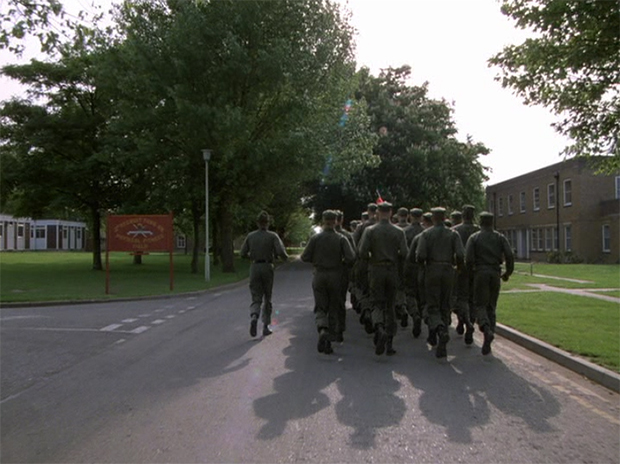
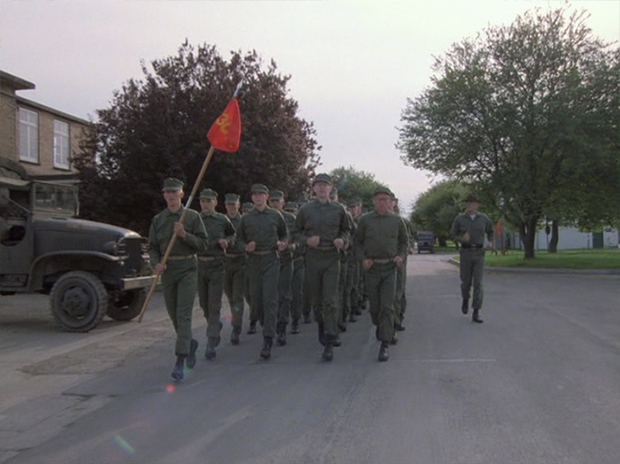
54 The recruits jogging from the front. (7:10)
HARTMAN:
Left, right, left, right, left...
JOKER (voice-over): Parris Island, South Carolina, the United States Marine Corps Recruit Depot. An eight-week college for the phony-tough and the crazy-brave.
Hartman calls cadence.
HARTMAN: Mama and Papa were laying in bed
RECRUITS: Mama and Papa were laying in bed
HARTMAN: Mama rolled over And this is what she said
RECRUITS: Mama rolled over, this is what she said
HARTMAN: Oh, give me some, give me some
RECRUITS: Oh, give me some, give me some
HARTMAN: P. T.
RECRUITS: P. T.
HARTMAN: P. T.
RECRUITS: P.T.
HARTMAN: Good for you
RECRUITS: Good for you
HARTMAN: And good for me
RECRUITS: And good for me
HARTMAN: Mmm, good
RECRUITS: Mmm, good
HARTMAN: Up in the morning to the rising sun
RECRUITS: Up in the morning to the rising sun
HARTMAN: Gonna run all day...
55 LS of recruits climbing the rope net of an obstacle course before a blood red sky colored by the setting sun. (7:52)
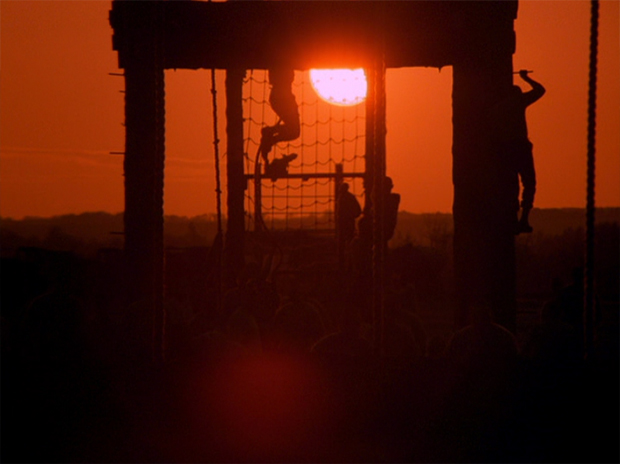
HARTMAN (voice-over): ...till the running's done
RECRUITS: Gonna run all day till the running's done
HARTMAN: Ho Chi Minh is a son of a bitch
RECRUITS: Ho Chi Minh is a son of a bitch
HARTMAN: Got the blue balls, crabs, and the seven-year itch
RECRUITS: Got the blue balls, crabs, and the seven-year itch
56 Crossfade to LS of soldiers marching. (8:08)
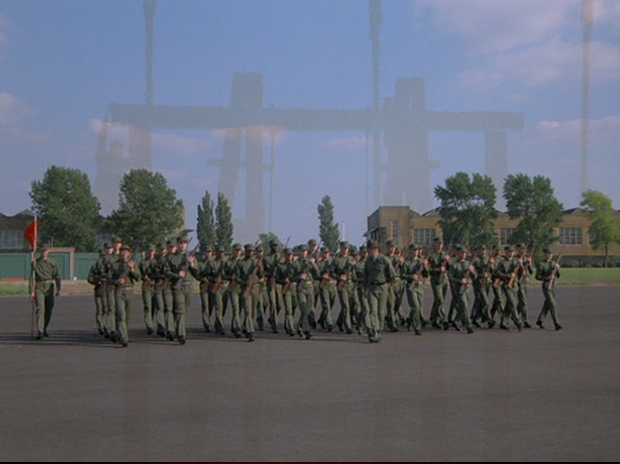
HARTMAN: Left, right, left, right, left. Your left shoulder. Hut! Left, right, left. Port. Hut! Left, right. Attack. Halt. Left shoulder. Hut!
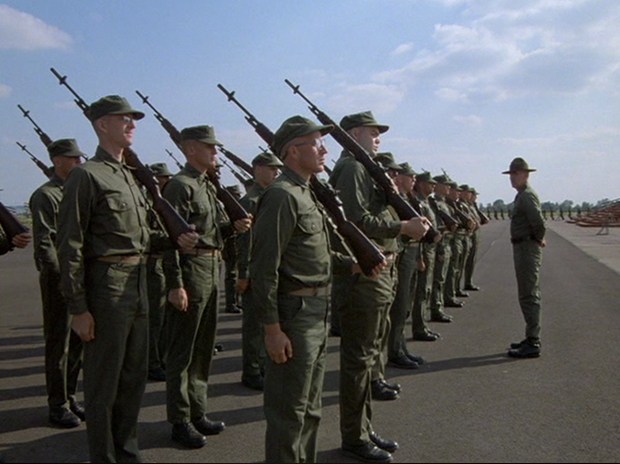
Pyle places his rifle first on his right shoulder, then shifts it to his left. Seeing this, Hartman rushes over to him.
57 CMS of Pyle from behind Hartman. (8:45)
HARTMAN:
Private Pyle, what are you trying to do to my beloved Corps?
PYLE: Sir, I don't know, sir.
HARTMAN: You are dumb, Private Pyle, but do you expect me to believe that you don't know left from right?
PYLE: Sir, no, sir.
HARTMAN: Then you did that on purpose. You wanna be different.
PYLE: Sir, no, sir.
HARTMAN (slaps the left side of Pyle's face): What side was that, Private Pyle?
PYLE: Sir, left side, sir.
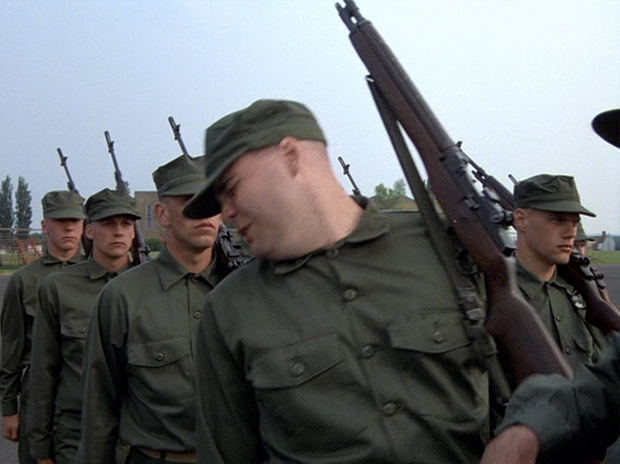
58 CU of Hartman from the side of Pyle. (8:49)

HARTMAN: Are you sure, Private Pyle?
PYLE: Sir, yes, sir.
59 CMS of Pyle from behind Hartman. (8:51)
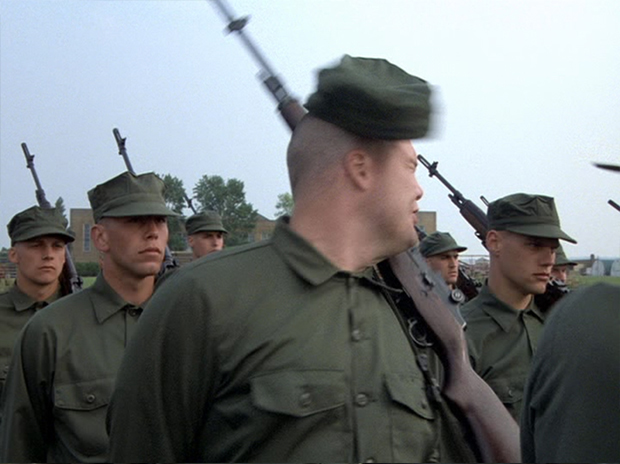
HARTMAN (slaps the right side of Pyle's face, knocking off his hat): What side was that, Private Pyle?
PYLE: Sir, right side, sir.
HARTMAN:
Don't fuck with me again, Pyle. Pick up your fucking cover.
PYLE: Sir, yes, sir.
60 Begin crossfade to LS of the recruits marching. It is likely another day, Hartman in his dress uniform rather than his utilities. (9:01)
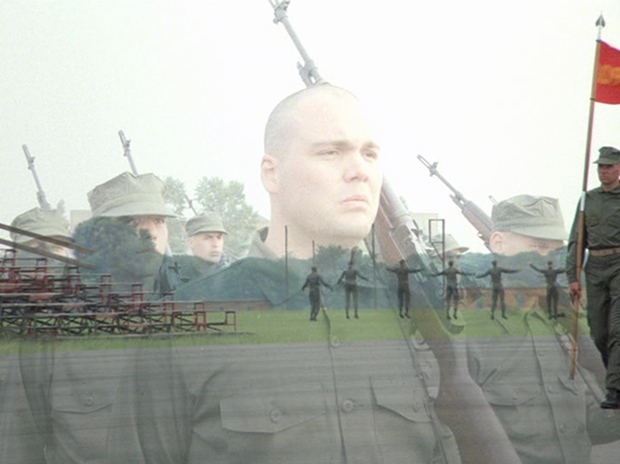
HARTMAN: Your left shoulder. Left, right, left. Port. Left shoulder. Your right shoulder.
Left, right, left, right. Your left shoulder. Left, two, three, four. Your right shoulder.
We see Pyle trailing up the rear, forced to walk as a toddler, his pants pulled down his ankles, sucking his thumb. In the distance are recruits performing jumping jacks.
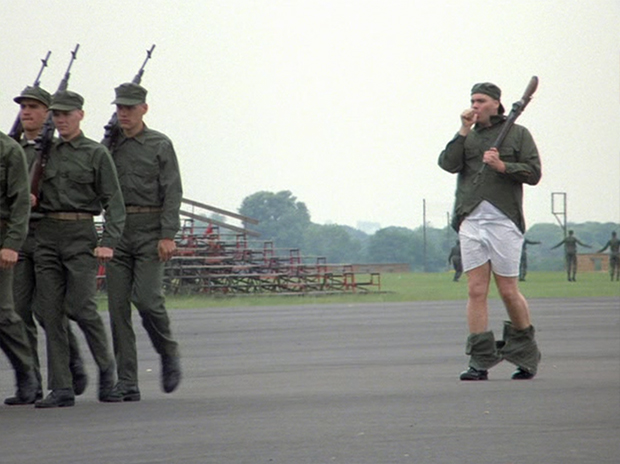
(In this section I discuss ideas based on Kubrick's counting shots in his films. If this seems unlikely to you, please read my essay, A Brief Primer on Stanley Kubrick's Counting of Shots in his Films, which, I think, undeniably evidences that he did so. My favorite example is how in Killer's Kiss he anticipates the number of shots in the film, verbally, immediately before the end.)
On a purely practical level, it's important that the recruit know their left from their right. A confusion of left and right, while drilling, leads to utter confusion. Directional confusion and dyslexia (directional confusion frequently occurs with dyslexia but is not dyslexia) be damned, if you're marching you must know your left from your right. It's now reported that about 25 percent of the population has left-right confusion and undoubtedly the military is going to have been aware of this since the advent of marching. Thus addressing the left-right confusion can be found in The D.I., Tribes, and Full Metal Jacket. it isn't in The Short-timers.
At the beginning of The D.I., before we are shown Jack Webb's face, we are introduced to several recruits that he's called individually to his office. He addresses one of them:
D.I.: You got started out on the wrong foot, didn't you? You started out on the right foot instead of the left. But you're squared away now, aren't you? You saw the great light...the white light...the guiding light. You got the vision? You gonna be a good marine? All right, get out of here."
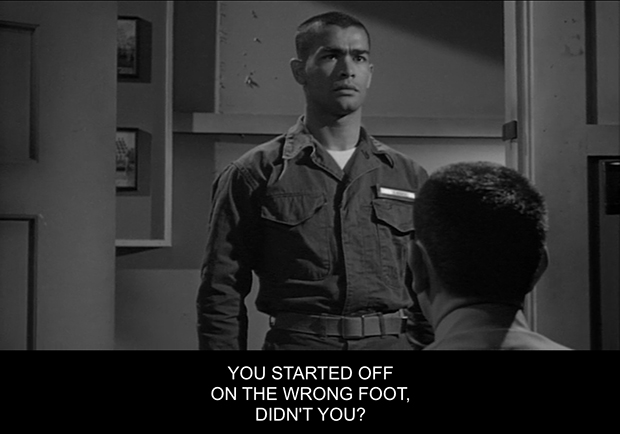
It could be argued the message is likely not directional confusion but attitude, and philosophical, that the recruit has had to align himself appropriately. But I would hazard it also represents left-right confusion in a practical sense while serving as a metaphor for not being in sync with the others. It isn't one thing or the other. It is both things.
In the movie, Tribes, the character of Quentin is similarly called to the D.I.'s office where he is berated for not knowing his left from his right and is tasked with holding his left arm up until the D.I. tells him he can put it down.
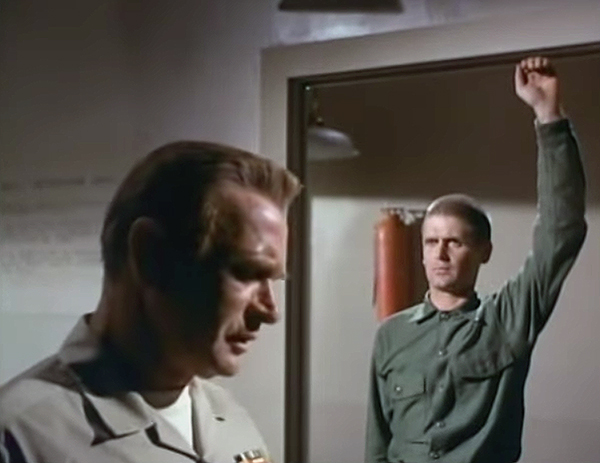
Pyle, in The Short-timers, never evidences directional confusion. There is no scene in which he confuses left and right and rests his rifle on his left shoulder. Kubrick has pulled it in from such films as The D.I. and Tribes.
Appropriately, leading in to the berating of Pyle for the left/right confusion, there is some subtle shadow play that is directionally confusing. Preceding shot 55 of the sun, in shot 53 the recruits march with their shadows stretching long behind them, then cut to shot 54, the implication being that this is the same session, no break in time, but their shadows stretch long before them. To add to the impression that there is no break in time, that they march in the same place, in shot 53 they are marching in the direction of a long two-story brick buildingthat is on their right, then in shot 54 they are passing a two-story brick building that can be easily mistaken as being the same one. Plus in shot 53 they were passing a T-intersection on their left, and in shot 54 we have the same. But if we examine the locations, they are not the same, the buildings are different. However, and this is what matters, Kubrick has framed the environment of the two shots so that they are similar and we would be led to think that shot 54 is a continuation of shot 53 when it isn't.
But for what all this means to Kubrick--and it does mean more than directional confusion--we need to take a look at his playing with doubles and utilization of horizontal flips in his films, such as in 2001, as I've addressed in detail in Kubrick's Single Horizontal Flip of a Front Screen Projection Landscape in the Dawn of Man Section in 2001 and the Meaning of that Flip in Relation to the Final View of the Monolith.
In shot 55 of Full Metal Jacket, as we hear the cadence call "Up in the morning to the rising sun", we observe the red sun dawn behind men on the obstacle course.

In 2001, we first see the red sun dawning, not just its glow but a shaft of red radiance breeching the hills, in shot 5. The monolith first appears in shot 55 in 2001, and if we are attentive we see that the sky and distant landscape used in shot 5 is used again for this shot (though we don't see the sun), and is flipped, mirrored. Then, in the next shot the sky and distant landscape returns to its previous orientation. As I state in my essay, that the horizontal flip occurs with shot 55 is itself expressive of the doubling/mirroring inferred with the horizontal flip that occurs in that shot, and I hazard that confirmation is given in shot 595.

At the end of the film, when the monolith appears to Dave in his bed, it is with shot 595 that the camera zooms in on the monolith, and as it does so the roomtakes on perfect mirrored symmetry to either side of it, and we observe how the monolith is the between, the line that makes the mirroring, dividing left from light, yet is also the space in which left and right are extinguished.
Dave is reborn. If you add the digits of a number the 9 always disappears, such as with adding 5 and 9 and 5 one gets 14 plus 5 is 19 is 10 is 1. 5 and 5 is 10 plus 9 is 19 is 10 is 1. With 595 Kubrick has returned us to shot 55, the monolith's first appearance, when the landscape was reversed, mirrored (though we didn't see the doubles alongside one another, as we do in The Shining, and the doubles face one another in Fear and Desire). The practice of adding numbers in this manner, related to gematria, letters having number values, is isopsephy. We could look on 55 as being the Jewish number/letter 5=Heh, side by side, which is related to how the ten commandments were written so there were 5 on the left stone and 5 on the right. According to Jewish gematria, 9 signifies truth and eternity as all multiples of the number 9 are 9 when reduced. Also, according to tradition, the stones were inscribed clear through so that on the reverse side the writing was seen in mirror form and yet understood.
Dave is reborn at the end of 2001. The recruits are reborn, after a fashion, on Parris Island, but they are reborn in the way that we find early humanoids are changed with the appearance of the monolith. We can compare the rebirth of the recruits to, after the appearance of the monolith, early humanoids discovering the use of tools for purpose of self-protection from predators, for the killing of food, for the territorial protection of a water hole, for violence and blood shed. But the recruits have also regressed so they are animals. They compare themselves to animals in the novel.
61 The squad bay at night, the soldiers in their skivvies. The drill instructor enters the middle of the room from the side of the Exit door. Our view is starboard and we will see that there are now only seemingly 9 racks. Pyle is the 13th man down and Cowboy and Joker are the 17th and 18th, so Pyle is at rack 7 and Cowboy and Joker occupy rack 9. (9:34)

HARTMAN: Tonight you pukes will sleep with your rifles. You will give your rifle a girl's name, because this is the only pussy you people are going to get. Your days of finger-banging old Mary Jane Rottencrotch through her petty pink panties are over. You're married to this piece, this weapon of iron and wood, and you will be faithful. Port!
Hartman turns and faces the other direction, having reached the end of the squad bay.
62 Line of racks on the screen left, Joker to the fore. (10:06)
HARTMAN: Port. Heh! Prepare to mount.
63 MCU of Hartman. Beyond him as a table upon rests two trophies to either size of a bronzed boot. There's a Marine Corps poster on the wall that reads "PRIDE The United States Marine Corps BUILDS MEN"". (10:14)
HARTMAN:
Mount!
64 The men recline on their beds, each holding his rifle. (10:18)
65 Hartman, as in shot 63. (10:20)
HARTMAN:
Port. Huh!
66 View of men in the top racks, Cowboy foremost. (10:23)
67 MCU of Hartman as in shot 65. (10:28)
HARTMAN: Pray!
68 View of men in bottom racks, Joker foremost. (10:31)
RECRUITS: This is my rifle. There are many like it, but this one is mine. My rifle is my best friend. It is my life.
69 View of men in top racks. (10:40)
RECRUITS:
I must master it as I must master my life. Without me, my rifle is useless. Without my rifle, I am useless.
70 CU of Joker in profile. (10:49)
RECRUITS:
I must fire my rifle true. I must shoot straighter than my enemy, who is trying to kill me. I must shoot him before he shoots me. I will.
71 MCU of Pyle on his top rack, view also of individual on lower rack next to his. (11:00)
RECRUITS:
Before God, I swear this creed. My rifle and myself are defenders of my country. We are the masters of our enemy. We are the saviors of my life.
So be it...
72 MCU of Hartman entering the frame from screen left, now standing before the open exit door. A sign reads "Divine Worship, Protestant, Catholic..." (11:16)
RECRUITS:
...until there is no enemy, but peace. Amen.
HARTMAN: Arm. Huh!
73 View of men in top racks. They lay their rifles by their sides. (11:20)
74 Hartman cuts off the light as he speaks. (11:23)
HARTMAN: At ease. Good night, ladies.
RECRUITS: Good night, sir.
HARTMAN (turning and exiting, he speaks to a waiting guard): Hit it, sweetheart!
RECRUIT: Aye, aye. Sir!
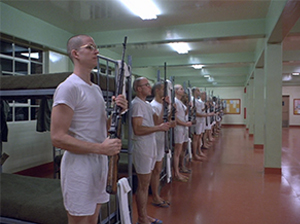 62 |
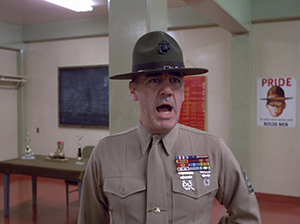 63 |
|
 64 |
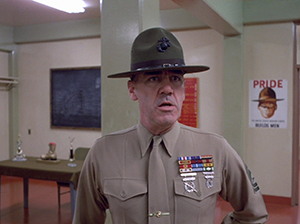 65 |
|
 66 |
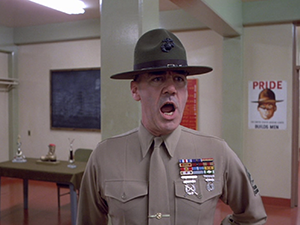 67 |
|
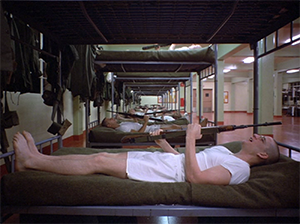 68 |
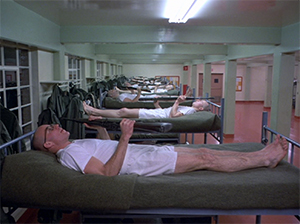 69 |
|
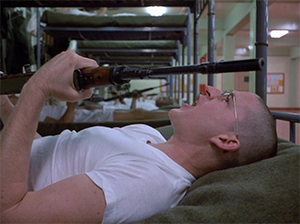 70 |
 71 |
|
 72 |
 73 |
|
 74 |
||
75 Dawn. Exterior shot of Hartman with the platoon conducting a rifle drill. (11:32)
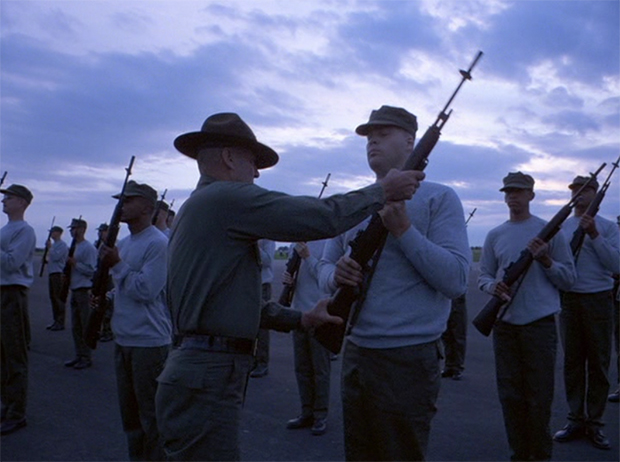
Right shoulder. Hut! (Pauses to adjust Cowboy's rifle, Cowboy standing 2nd from the left.) That is not your daddy's shotgun, Cowboy. Left shoulder. Hut! (Addresses Joker who is 4th from the left.) Move the rifle around your head, not your head around the rifle. Port. Hut! (Furiously adjusts Pyle's rifle, Pyle being 6th from the left.) Four inches from your chest, Pyle. Four inches!
Hartman has ended in pressing Pyle's rifle right up against his chest.
76 Interior of squad bay, a marching drill with rifles is conducted with the men in their skivvies. The camera zooms out from a CU on Hartman. (12:05)

HARTMAN: This is my rifle, this is my gun. This is for fighting, this is for fun
RECRUITS: This is my rifle, this is my gun. This is for fighting, this is for fun
HARTMAN: This is my rifle, this is my gun. This is for fighting, this is for fun
RECRUITS: This is my rifle, this is my gun. This is for fighting, this is for fun
HARTMAN (turns to walk back in the opposite direction):
This is my rifle, this is my gun. This is for fighting, this is for fun.
The fetishizing of the rifle, to which the recruit shall consider himself married, is so overt, there isn't much to add to what is plainly portrayed. We can already see where this is going with, at film's end, the discovery that the sniper is a woman. But between now and then we will have the rifle being turned on Hartman, then on Pyle himself, in the head, and with this prayer scene we have our first glimpse of the head beside which stands a recruit who has drawn fire watch and is armed with a baton and flashlight, which seems to anticipate Joker on fire watch the night of Pyle's suicide. When we get to that suicide scene we'll see that Kubrick has even downplayed the sexualization of the rifle, how it is made into an intimate partner in The Short-timers. Even if Kubrick downplays certain things in the novel so they are not so extremely depicted in the film, he does make clear how boot camp separates the recruit from all his former attachments, familial, romantic, social, spiritual, all that he has valued, everything from which he has derived self-value and esteem, such as Joker's feeling that he is a writer because he wrote in high school, something which he feels he is good at, it is something which he believes he *is*, presumably something which makes him feel good about himself, which he has seen as a way he can productively fit into the world. The D.I. will insist he is not a writer, he is a killer. The critical foundations of one's life are torn apart and denigrated. Near sacred barriers are exploded, especially through the violation of taboos. Nothing is left intact. All areas of one's former life, all parts of one's self, are devastated and replaced with the primal directive that one is a killer, that one lives for the brotherhood of the Marines and to die for the Marines. And, it would seem especially for a teenager or very young adult, this is a crucial time in the formation of attitudes toward sexuality, toward how to value and relate to one's own body and the partner's body, how sexuality fits into life and partnership, that respect can't be had if the complexity of every individual is smashed through what can only be described as a process by which one is reformed to feel only contempt and hatred for what is not the Marine Corps and the act of killing. Human life loses all meaning.
In the book, events of the 6th week include the naming of the rifles.
During our sixth week, Sergeant Gerheim orders us to double-time around the squad bay with our penises in our left hands and our weapons in our right hands, singing: This is my rifle, this is gun; one is for fighting and one is for fun. And: I don't want no teen-aged queen; all I want is my M-14.
Sergeant Gerheim orders us to name our rifles. "This is the only pussy you people are going to get. Your days of finger-banging ol' Mary Jane Rottencrotch through her pretty pink panties are over. You're married to this piece, this weapon of iron and wood, and you will be faithful."
We run. And we sing:
Well, I don't know
But I been told
Eskimo pussy
Is mighty cold...
The recitation of the Rifleman's Creed, doesn't occur until the end of the 7th week, seemingly on the Sunday of the "magic show" when Joker tells Cowboy that Leonard is talking to his rifle, Leonard having suffered his beating by the recruits several days earlier. Joker relates how at night they mount their racks with their rifles, and say their prayers.
Then the Rifleman's Creed, by Marine Corps Major General W.H. Rupertus:
This is my rifle. There are many like it but this one is mine. My rifle is my best friend. It is my life. I must master it as I master my life.
My rifle, without me, is useless. I must fire my rifle true. I must shoot straighter than my enemy who is trying to kill me. I must shoot him before he shoots me.
I will.
Leonard is speaking for the first time in weeks. His voice booms louder and louder. Heads turn. Bodies shift. The platoon voice fades. Leonard is about to explode. His words are being coughed up from some deep, ugly place. Sergeant Gerheim has the night duty. He struts to Leonard's bunk and stands by, fists on hips.
Leonard doesn't see Sergeant Gerheim. The veins in Leonard's neck are bulging as he bellows:
MY RIFLE IS HUMAN, EVEN AS I, BECAUSE IT IS MY LIFE. THUS I WILL LEARN IT AS A BROTHER. I WILL LEARN ITS ACCESSORIES, ITS SIGHTS, ITS BARREL.
I WILL KEEP MY RIFLE CLEAN AND READY, EVEN AS I AM CLEAN AND READY. WE WILL BECOME PART OF EACH OTHER.
WE WILL...
BEFORE GOD I SWEAR THIS CREED. MY RIFLE AND MYSELF ARE THE MASTER OF OUR ENEMY. WE ARE THE SAVIORS OF MY LIFE.
SO BE IT, UNTIL VICTORY IS AMERICA'S AND THERE IS NO ENEMY BUT PEACE!
AMEN.
Sergeant Gerheim kicks Leonard's bunk. "Hey--you--Private Pyle..."
"What? Yes? YES, SIR!" Leonard snaps to attention in his bunk. "AYE-AYE, SIR!"
"What's that weapon's name, maggot?"
"SIR, THE PRIVATE'S WEAPON'S NAME IS CHARLENE, SIR!"
"At ease, maggot." Sergeant Gerheim grins. "You are becoming one sharp recruit, Private Pyle. Most motivated prive in my herd. Why, I may even allow you to serve as a rifleman in my beloved Corps. I had you figured as a shitbird, but you'll make a good grunt."
"AYE-AYE, SIR!"
I look at the rifle on my rack. It's a beautiful instrument, gracefully designed, solid and symmetrical. My rifle is clean, oiled, and works perfectly. It's a fine tool. I touch it.
The current text of The Rifleman's Creed:
This is my rifle. There are many like it, but this one is mine.
My rifle is my best friend. It is my life. I must master it as I must master my life.
Without me, my rifle is useless. Without my rifle, I am useless. I must fire my rifle true. I must shoot straighter than my enemy who is trying to kill me. I must shoot him before he shoots me. I will ...
My rifle and I know that what counts in war is not the rounds we fire, the noise of our burst, nor the smoke we make. We know that it is the hits that count. We will hit ...
My rifle is human, even as I [am human], because it is my life. Thus, I will learn it as a brother. I will learn its weaknesses, its strength, its parts, its accessories, its sights and its barrel. I will keep my rifle clean and ready, even as I am clean and ready. We will become part of each other. We will ...
Before God, I swear this creed. My rifle and I are the defenders of my country. We are the masters of our enemy. We are the saviors of my life.
So be it, until victory is America's and there is no enemy, but peace!
The book makes clear how deeply into unconscious territory the recruits receive this information that the rifle is their spouse, a part of themelves. Joker is troubled when he wakes up one night to find that he has at some point brought the rifle into bed with him. The change in him is at work even before he consciously realizes it. Earlier in the book, Joker is repulsed by the rifle. By the time, in the book, that we have the recitation of the Rifleman's Creed, he sees it as a beautiful instrument, symmetrical, working perfectly, a fine tool, and is no longer repelled when touching it.
There's a scene in the book, depicted a little differently in the film, in which Joker has a confrontation with a Colonel over the peace button Joker wears in Vietnam. In one interview with a veteran, he was talking about how the further out in the shit one got, the more no one cared what you wore. In the peace symbol scene, Joker is not so far out that a Colonel doesn't care about his peace button.
"Confess, Corporal, confess that you want peace."
I give him a Short Pause. "Doesn't the colonel want peace...sir?"
The colonel hesitates. "Son, we've all got to keep our heads until this peace craze blows over. All I have ever asked of my boys is that they obey my orders as they would obey the word of God."
The last line of the Rifleman's Creed is: "So be it, until victory is America's, and there is no enemy, but peace." It would be too easy in recitation to remove the comma following "enemy" so the Creed instead reads, "So be it, until victory is America's, and there is no enemy but peace". Peace becomes the enemy, as Gustav points out in the novel.
In this scene we observe a table covered with a cloth, with two seeming awards situated to either side of a bronzed boot.
The table is rather set up like an altar/honored display for these special, venerated objects, and looking around online I've seen one instance of a trophy awarded to a boot camp company, real boots set on a wood platform, but I can well imagine someone coming up with a bronzed boot award.
The John Wayne pro-war movie, The Green Berets is mentioned in The Short-timers, Joker and others finding it to be the funniest thing they've seen in a while. For sake of this analysis, I watched The Green Berets and one of its more unintentionally hilarious moments reminds me of that isolated boot on the table. David Janssen--who was in real life anti-war and is said to have gotten into arguments with Wayne on the set over this--plays an anti-war journalist who attaches himself to John Wayne's platoon in order to learn about the war for himself, and of course he comes out pro-war after his experiences. In one scene, when their base comes under attack, a lieutenant rushes Janssen to safety. He urges Janssen into a bunker just as a mortar hits that vaporizes the lieutenant, and then we see Janssen, who's unaware of what's happened, looking around for the lieutenant. Janssen is standing so his head and shoulders are just above ground level, out of the bunker, and we see just beyond him a literally smoking boot. That's the lieutenant's boot. That's all that's left of him. A boot with smoke floating out of it. Janssen is asking where the lieutenant is, he was right there, and he's told he's gone. When I saw the smoking boot I had to rewind to make sure smoke was literally coming out of the boot, which it was, and I howled. It's supposed to be a horrible moment but in John Wayne's clumsy pro-war hands it comes out funny.
Now, when I see that bronzed boot in this scene I think of that boot in The Green Berets.
The Green Berets is so bad that someone elected to embed in it not just one but two Wilhelm screams.
77 Crossfade to exterior scene of Hartman marching the recruits. Begin military drums, "Parris Island" soundtrack. (12:32)

78 The recruits climb knotted ropes, Joker and Cowboy in the foreground. (12:49)

79 The recruits traverse the monkey bars, Joker among them. (12:59)
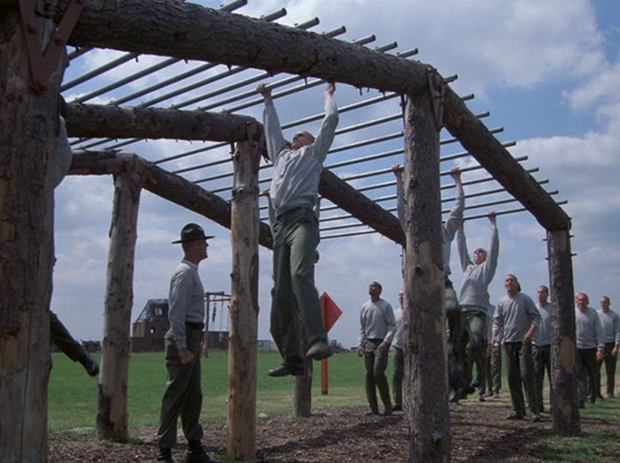
HARTMAN: Ten fucking seconds. It should take you no less than 10 fucking seconds to negotiate this obstacle. Quickly, move it out. There ain't one swinging-dick private in this platoon's gonna graduate until they can get this obstacle down to less than 10 fucking seconds.
80 LS of obstacle course ropes and A ladders. Military drumming soundtrack. (13:17)
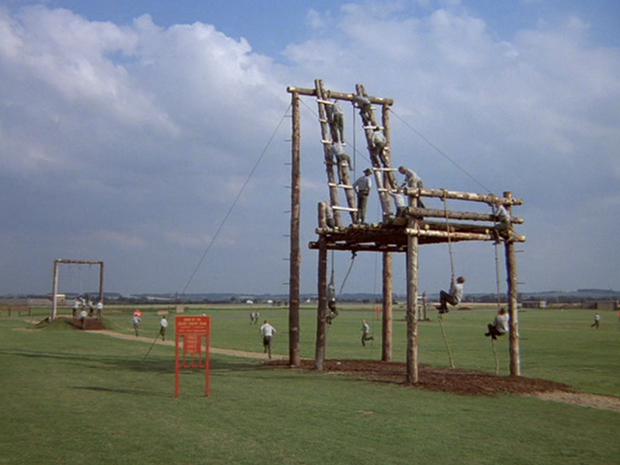
81 MLS of Joker descending a rope to the ground. (13:23)
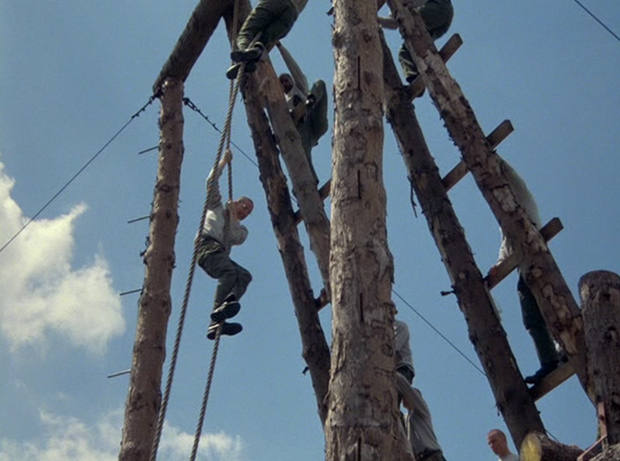
82 MS of combat training with pugil sticks. (13:33)
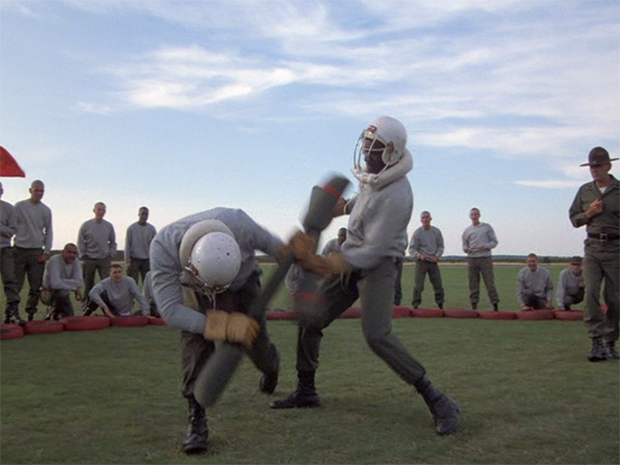
83 A closer shot of the men training appears to show "Hinter S." beating Pyle, who falls out of the ring. (13:40)

84 Recruits again navigating the obstacle course. A man named "Piper" waits his turn on three irregularly spaced parallel bars made of tree trunks. (13:42)

HARTMAN: Next two privates. Quickly. Get over that goddamn obstacle. Move it.
85 "Piper" is now not included in the next two privates awaiting their turn, Joker (Davis) instead in Piper's place. Pyle is observed two men behind him. (13:48)
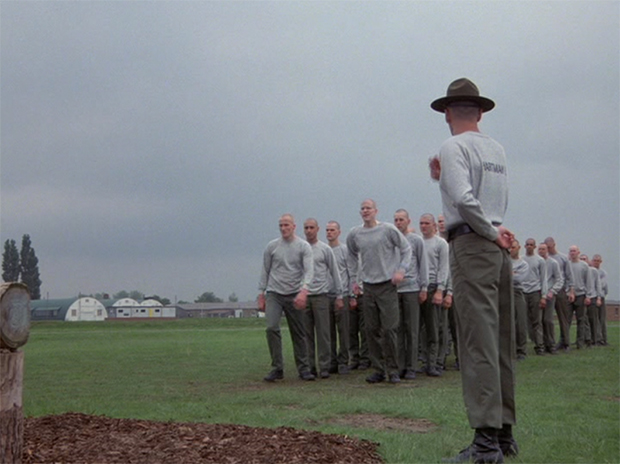
HARTMAN: Next two privates. Quickly. Hurry up. Get up there. Private Joker, are you a killer?
JOKER: Sir, yes, sir.
HARTMAN: Let me hear your war cry.
JOKER: Agh!!!!
86 We now see Pyle is first in line on screen right when he had previously been 2nd down behind Joker. (13:57)
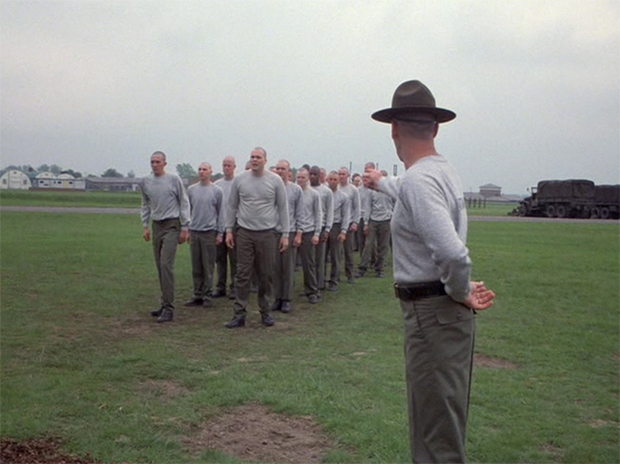
HARTMAN: Next two privates, go. Quickly. Get your fat ass over there, Private Pyle. Oh, that's right, Private Pyle. Don't make any fucking effort to get up to the top of the fucking obstacle. If God wanted you up there, he would have miracled your ass up by now, wouldn't he?

87 Cut to Pyle struggling to stand and try again, having fallen. (14:15)
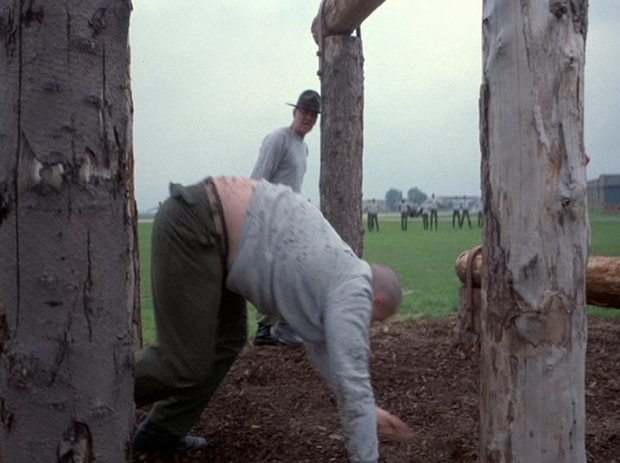
PYLE: Sir, yes, sir.
HARTMAN: Get your fat ass up there, Pyle.
PYLE: Sir, yes, sir.
HARTMAN: What the hell is the matter with you anyway? I'll bet if there was some pussy up there on top of that obstacle, you could get up there. Couldn't you?
PYLE: Sir, yes, sir.
HARTMAN: Your ass looks like about 150 pounds of ...
88 CU of Cowboy watching. (14:30)
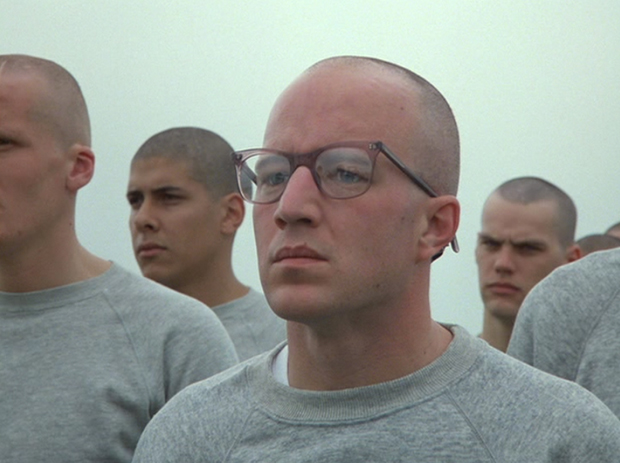
HARTMAN: ...chewed bubble gum, Pyle. Do you know that?
PYLE: Sir, yes, sir.
89 The recruits do pull-ups, Joker at the fore. (14:34)
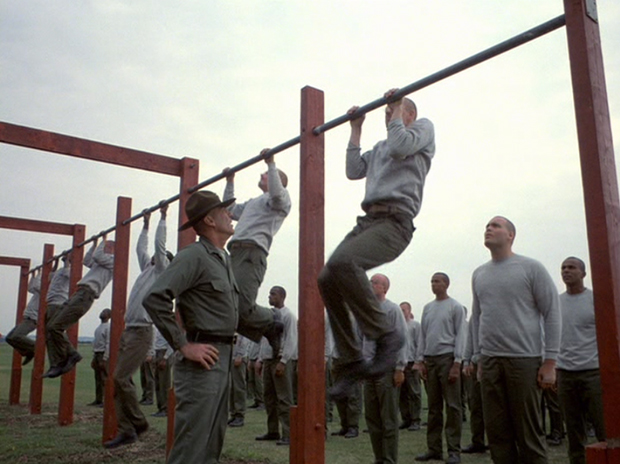
HARTMAN: One for the commandant. One for the Corps. Get up there. Pull. I guess the Corps don't get theirs. (Joker unable to do the last pull-up, he is passed along, and Pyle is next called up.) Get up there, Pyle. Pull. Pull, Pyle, pull. One pull-up, Pyle. Come on, pull. You gotta be shitting me, Pyle. Get your ass up there.
90 MCU of Pyle attempting a pull-up. (15:02)
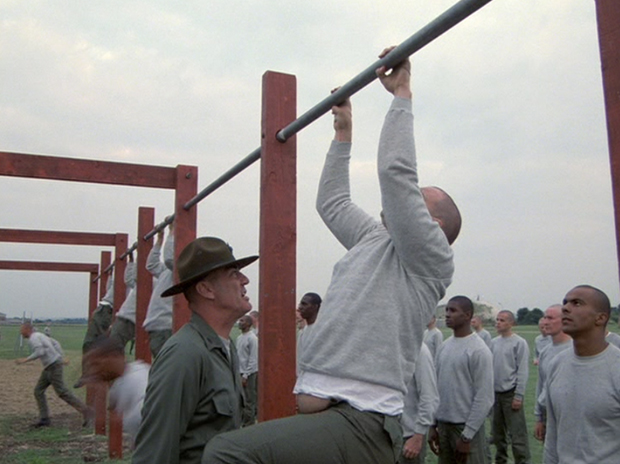
HARTMAN:
Do you mean to tell me that you cannot do one single pull-up? You are a worthless piece of shit, Pyle. Get out of my face. Get up there, Snowball.
91 Pyle climbs the "Stairway to Heaven" obstacle, on top of which sits Hartman. We see the names of a few who are also climbers, including Moses J. D, Barnard K., and Carter S. (15:13)
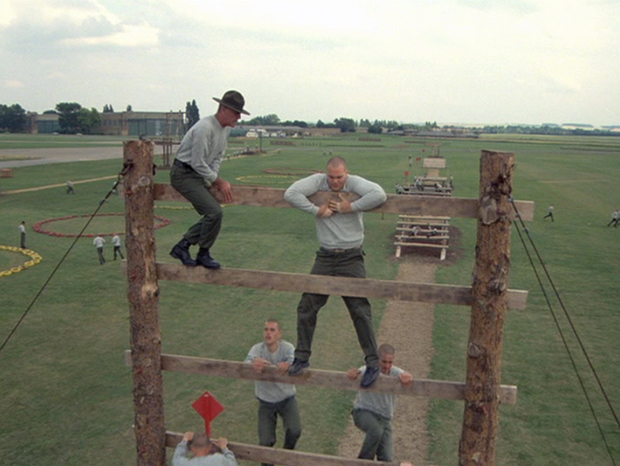
HARTMAN: Get up here, fat boy. Quickly. Move it up. Move it up, Pyle. Move it up. You climb obstacles like old people fuck. Do you know that, Private Pyle? Get up here. You're too slow. Move it. Move it. Private Pyle, whatever you do, don't fall down. That would break my fucking heart. Quickly. Up and over. Up and over. Well, what in the fuck are you waiting for, Private Pyle? Get up and over. Move it, move it, move it. Are you quitting on me? Well, are you? Then quit, you slimy fucking walrus-looking piece of shit. Get the fuck off of my obstacle. Get the fuck down off of my obstacle. Now. Move it. I'm gonna rip your balls off so you cannot contaminate the rest of the world. I will motivate you, Private Pyle, if it short-dicks every cannibal on the Congo.
92 MS of Joker dragging Pyle along on a hike as Hartman jogs alongside. (16:20)

HARTMAN:
Pick them up and set them down, Pyle. Quickly. Move it out. Were you born a fat, slimy, scumbag, you piece of shit, Private Pyle? Or did you have to work on it? Move it up. Quickly. Hustle up. The fucking war will be over by the time we get out there, won't it, Private Pyle? Move it.
93 MS from behind of Joker supporting Pyle. (16:47)

HARTMAN:
Are you going to fucking die, Pyle? Are you going to die on me? Do it now. Move it up. Hustle it up. Quickly, quickly, quickly.
94 MS from the front of Joker supporting Pyle. (16:59)
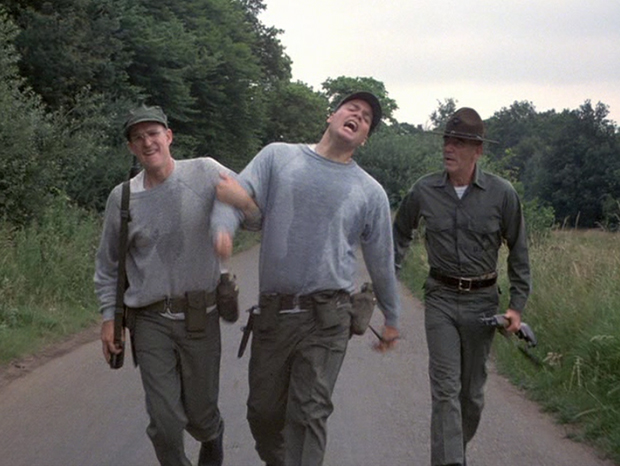
HARTMAN:
Do you feel dizzy? Do you feel faint? Jesus H. Christ, I think you've got a hard-on.
95 Slow motion MS from the front of Joker supporting Pyle through the mud. (17:13)
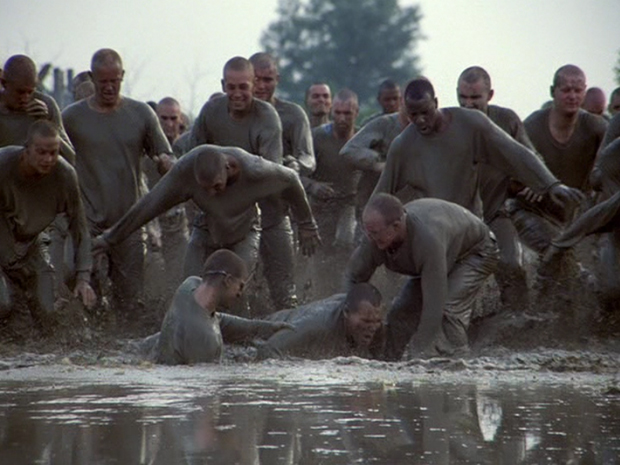
HARTMAN:
Quickly, ladies. Assholes and elbows. Move it out. Get up here. Move it. Move it, move it, move it. Quickly. Quickly. Get up here. Hurry up. Move it out.
Pyle falls as they run, dragging Joker down with him. Cowboy, running alongside, reaches down to help pull them back up.
Fade to black.
Even before Hartman selects and tasks Joker with retraining Pyle, Joker has somehow become the individual who helps Pyle, to his own detriment, Cowboy helping as needed but only to assist his friend, Joker, for not only do early training scenes in the film show the harassment of Pyle they also establish for us the friendship that is forming between Joker and Cowboy. With the mud pool obstacle, Kubrick places Joker, Pyle, and Cowboy in the lead, before all the others, and as Pyle falls and pulls down Joker, Cowboy reaches down to try to pull Pyle up, which one feels is less for sake of Pyle than Joker--as well as all those behind them, because they stand to fall over Pyle and Joker. However much we sympathize with Pyle's plight, in the mud pool shot we see that an individual who is unable to keep up can be detrimental to the whole group. Pyle's problems are such that in real life he might be dropped down to another company where he has extra time for special training before trying boot camp again, but the author, Gustav, has Hartman persist in keeping Pyle with the platoon, as does Kubrick.
An interesting shot in this obstacle training section is the one of Cowboy gazing on as Hartman verbally assails Pyle, which one may take as concern and sympathy for Pyle, but could very well instead be disgust for Pyle as an individual whose problems hold up the group as a whole. It's an atypical shot for this film, this close-up of Cowboy, and is perhaps the only one that focuses on Cowboy regarding Hartman's abuse of Pyle.
The Stairway to Heaven is the actual name of the high ladder on the obstacle course, but in context of Kubrick's other films there may be more going on here than Kubrick only portraying the difficulties of the obstacle course. It had occurred to me that we are suddenly viewing here the names of individuals via the back of their sweatshirts. In The Shining, during Danny's first vision sequence of the bloody elevator and the two girls, which he begins to experience while talking to his invisible friend, Tony, in the mirror (doubling, Danny facing himself in the mirror), Krysztof Penderecki's, "The Awakening of Jacob" plays. This brings in the story of Jacob who has a terrifying dream of angels ascending and descending a heavenly ladder. Upon waking, he named the rock, which had served as his pillow, Bethel, the House of God. Later, he will have a companion dream in which he wrestles with an angel until dawn, and due the angel's inability to overome him, their equitability, Jacob receives the blessing of a second name, which is a kind of rebirth. Then, breaking the stalemate, the angel injures Jacob's thigh. With our observing the names on the back of the sweatshirts, we are being reminded these individuals had other names before receiving their reborn Marine Corps names, we are learning that Joker is Davis, and Cowboy is Evans--but we may also be reminded of Jacob receiving his new name after wrestling with the angel when, after the success of the recruits with climbing the ladder, as they turn and descend we see their name on the back of their shirt. One of the names observed is even a biblical name, Moses, a legendary story of whom is of his communing with God and imparting to the captive Israelites the knowledge of hiding their first born from the angel of death by applying lamb's blood to their door posts, hiding them from view. Moses' name is not the one with which he was born, as in order to save him as a child, when Israel's male children were being killed, he he was hidden in a basket on a river, where he was found by Pharaoh's daughter who raises him and names him. So he is another figure who has two names.
As I write in my analysis on The Shining:
Significantly, Jacob was a twin, but not an identical twin. His hairy, red brother was named Esau. Esau would lose not only his birthright to Jacob, but his father's blessing as well, through Jacob's guile and his deceit of masquerading as Esau in order to procure the blessing. Kabbalistically, Jacob corresponds with the mystic, inner life, while Essau's is that of physical action. The pair are an expression of the idea of a struggle of universal forces ever in conflict, and it's held that never can both exist on the same plane. The prophecy concerning them was, "One people will be stronger than the other." The Talmud said of them, "When this one falls, the other one rises." They are the very definition of balance and imbalance. When one ascends, the other must descend and vice versa, a matter of physical law. Is the desirable state one of equilibrium, such as had at the equinoxes? And, if so, how long can such an equilibrium be sustained, and what throws it out of balance? With the equinoxes, it is the simple incessant progression of time that brings balance and then imbalance.
Jacob's name means to supplant (also to follow behind) and he was a trickster figure, in ways comparable to Joker who is a trickster figure and, like Jacob, is a mimic, Jacob having pretended to be Esau and Joker taking on the voice of John Wayne (but with the calling cadence sequences there is mimicry throughout the boot camp section of the film). As suggested above, some interpret the angel with whom Jacob wrestled as being Esau's guardian angel, or Esau himself. The particulars shift but key elements are the doublings, renamings, and variations in strength, such as we acknowledge each year by thinking in terms of the winter solstice being a time when the sun takes a turn and begins its ascent into strength again, a story expressed with the biblical Samson who was strong when his hair was long and lost power when it was shaved. Just as the new recruits are shaved and lose their sense of individuality, becoming powerless recruits.
I've written so much, in other analyses, on Kubrick's doublings that I feel like I'm being sketchy here, as in not exploring them to the degree that I should. But for the purpose of the moment I think it's enough to be aware that things such as the Stairway to Heaven do connect with other films of Kubrick's, and how we understand them is by way of considering how Kubrick works with these things in his other films, It's really as if Kubrick has some essential templates on how the world prospectively orders itself, which through the ages have been communicated in story, and Kubrick utilizes these stories and templates as frames for exploring possible outcomes, how to create new endings when possible, and how more deeply to understand these workings of the universe as comprehended/interpreted by religion and generations upon generations of story-tellers.
Hartman tells the recruits it should take them "no less than" 10 seconds to do the monkey bars obstacle, obviously meaning it should take them no more than 10 seconds. But he also catches and corrects his mistake for he then says that no one will graduate until they get the obstacle "down to less than 10 fucking seconds". One might assume this was an error that that was deemed non-critical and allowed to pass, or it's down the order of another example of left/right confusion, this time on Hartman's part. Every time we see Hartman's ribbons on his chest we might notice that his Presidential Unit Citation Award, the ribbon with the horizontal blue, yellow and red stripes, is worn upside down, as the blue is supposed to be up top whereas Hartman wears it with the red up top, but I've read that there are such mistakes as these.
In 2001, an effect of HAL's "malfunction", exhibited during the chess game with Frank, was revealed during his dialogue with Frank, when Frank loses at their game of chess. HAL related the moves as if viewing from Frank's perspective, the white side of the board rather than the black.
Kubrick has placed Snowball on the port side of the room, who right now is squad leader, while Joker is on the starboard side of the room. In the next section, Kubrick flips dominance to starboard by making Joker the squad leader, and we should probably consider how this relates to HAL, the chess game with Frank, and what follows.
An interesting edit is the one in which Pyle has fallen off the parallel bars and is struggling to stand. It's easy to miss when shot 86 ends and shot 87 begins, the end of one and the beginning of the other seeming as if the cutting out of a few frames. It's artistic here, but Kubrick has a quirky form of this in Killer's Kiss and The Killing and I have to wonder if, as Kubrick doesn't often use this kind of edit in his films, if this serves the same function as in Killer's Kiss and The Killing but has been reformed so it appears to be cinematic.
96 MLS of the hall to the squad bay, the lights flickering on. (17:31)

Black. The bugle sounds reveille as the lights flicker on. Hartman enters with his assistant D.I., picks up a metal trash can and begins beating it.
HARTMAN: Reveille. Reveille. Reveille. Drop your cocks and grab your socks. Today is Sunday. Divine worship at oh-eight-hundred. Get your bunks made and get your uniforms on.
Police call will commence in two minutes. Private Cowboy, Private Joker.
COWBOY: Sir, yes, sir.
JOKER: Sir, yes, sir.
HARTMAN: As soon as you finish your bunks, I want you two turds to clean the head.
COWBOY AND JOKER: Sir, aye, aye, sir.
HARTMAN: I want that head so sanitary that the Virgin Mary herself would be proud to go in there and take a dump.
COWBOY AND JOKER: Sir, yes, sir. Sir, yes, sir.
HARTMAN:
Private Joker, do you believe in the Virgin Mary?
JOKER: Sir, no, sir.
HARTMAN (throws the can to the side): Well, Private Joker, I don't believe...
97 MCU of Hartman from behind Joker. 18:21
HARTMAN: ...I heard you correctly.
98 MCU of Joker from behind Hartman. (18:22)
JOKER: Sir, the private said, "No, sir," sir.
99 MCU of Hartman from behind Joker. (18:24)
HARTMAN: Why, you little maggot. You make me wanna vomit. (He slaps Joker across the right cheek.)
100 MCU of Joker from behind Hartman. (18:27)
HARTMAN:
You goddamn communist heathen. You had best sound off that you love the Virgin Mary or I'm gonna stomp your guts out. Now, you do love the Virgin Mary, don't you?
JOKER: Sir, negative, sir.
HARTMAN: Private Joker, are you trying to offend me?
JOKER: Sir, negative, sir. Sir, the private believes that any answer he gives will be wrong, and the senior drill instructor will beat him harder if he reverses himself, sir.
101 MCU of Hartman from behind Joker. (18:48)
HARTMAN:
HARTMAN: Who's your squad leader, scumbag?
JOKER: Sir, the private's squad leader is Private Snowball, sir.
HARTMAN: Private Snowball.
102 LS of Private Snowball at his rack, who runs across the room to answer. (18:53)
SNOWBALL: Sir! Private Snowball reporting as ordered, sir.
HARTMAN: Private Snowball, you're fired. Private Joker is promoted to squad leader.
SNOWBALL: Sir, aye, aye, sir.
HARTMAN: Disappear, scumbag.
SNOWBALL: Sir, aye, aye, sir.
HARTMAN: Private Pyle.
PYLE: Sir, Private Pyle reporting as ordered, sir.
103 MCU of Hartman (19:09)
HARTMAN: From now on, Private Joker is your new squad leader and you will bunk with him. He'll teach you everything.
104 MCU of Pyle (19:13)
HARTMAN:
He'll teach you how to pee.
PYLE: Sir, yes, sir.
105 MCU of Joker, Hartman and Pyle from the side (19:17)
HARTMAN:
Private Joker is silly and he's ignorant, but he's got guts and guts is enough. Now, you ladies, carry on.
RECRUITS:
Sir, aye, aye, sir.
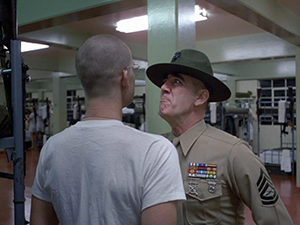 97 |
 98 |
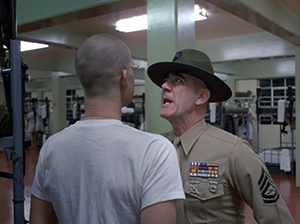 99 |
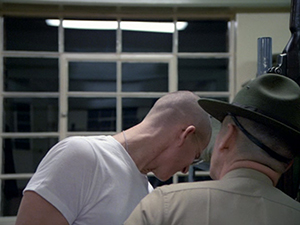 100 |
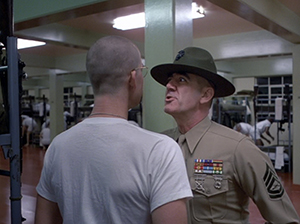 101 |
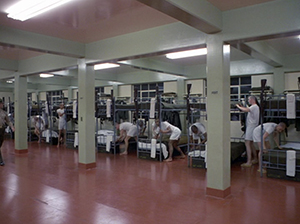 102 |
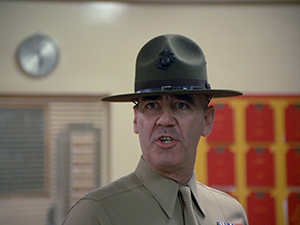 103 |
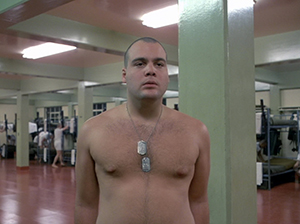 104 |
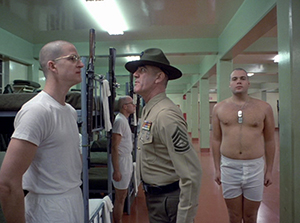 105 |
|
The Virgin Mary section begins with Hartman rousing the recruits by banging on a trash can. In The D.I. as well, Jack Webb terrorizes the recruits in the morning with the trash can.
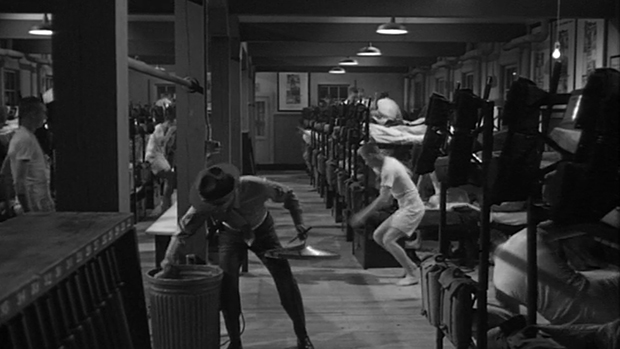
There is no scene in the book in which the recruits are awakened with the trash can, nor does this scene begin this way in the screenplay.
In the book, the Virgin Mary incident happens at the beginning of the 5th week. Leonard has proven resistant to any kind of physical and psychic abuse from the D.I. Ostensibly, because Joker has the guts to know and voice that at times there is No Right, he is made squad leader. He is also made Pyle's rack mate, and is tasked with the mission of re-instructing him on life, as if raising him from infancy. In the book, Joker protests that he doesn't want to be squad leader--the notion of being a leader is anathema to Joker--and would prefer to stay with Cowboy as his rack mate. One might be rather surprised that Hartman doesn't hammer him for that, just as one might also be surprised that Joker would even imagine such a request would be considered as he has been well versed in the fact that he has no freedom of choice for the time being.
It may be that Kubrick is linking this scene, which has to do with religion, back to the one in which Hartman had the men praying in their bunks. That one was at the end of the day, and he cut off the lights to the squad bay at the end of it, in shot 74, using the interior switches as he exited. This scene is at day's beginning, opens with darkness, and has Hartman cutting on the squad bay lights from the side of the outer hall as he enters then grabs up the trash can. In the book, the prayer scene happens during the seventh week at the conclusion of a Sunday, the day of the Magic Show (religious service). There is no Christmas scene in the book. Kubrick has split up the book's Sunday events so they occur in several scenes.
For the first four weeks of recruit training Leonard continues to grin, even though he receives more than his share of the beatings. Beatings, we learn, are a routine element of life on Parris Island. And not that I'm-only-rough-on-'um-because-I-love-'um crap civilians have seen in Jack Webb's Hollywood movie The D.I. and in Mr. John Wayne's The Sands of Iwo Jima. Gunnery Sergeant Gerheim and his three junior drill instructors administer brutal beatings to faces, chests, stomachs, and backs. With fists. Or boots--they kick us in the ass, the kidneys, the ribs, any part of our bodies upon which a black and purple bruise won't show.
But even having the shit beat out of him with calculated regularity fails to educate Leonard the way it educates the other recruits in Platoon 30-92. In high school psychology they said that fish, cockroaches, and even one-celled protozoa can be brainwashed. But not Leonard.
Leonard tries harder than any of us.
He can't do anything right.
During the day Leonard stumbles and falls, but never complains.
At night, as the platoon sleeps in double-tiered metal bunks, Leonard cries. I whisper to him to be quiet. He stops crying.
No recruit is ever allowed to be alone.
On the first day of our fifth week, Sergeant Gerheim beats the hell out of me.
I'm standing tall in Gerheim's palace, a small room at the far end of the squad bay.
"Do you believe in the Virgin Mary?"
"NO, SIR!" I say. It's a trick question. Any answer will be wrong, and Sergeant Gerheim will beat me harder if I reverse myself.
Sergeant Gerheim punches me in the solar plexus with his elbow. "You little maggot," he says, and his fist punctuates the sentence. I stand to attention, heels locked, eyes front, swallowing groans, trying not to flinch. "You make me want to vomit, scumbag. You goddamn heathen. You better sound off that you love the Virgin Mary or I'm going to stomp your guts out." Sergeant Gerheim's face is about one inch from my left ear. "EYES FRONT!" Spit sprinkles my cheek. "You do love the Virgin Mary, don't you, Private Joker? Speak!"
"SIR, NEGATIVE, SIR!"
I wait. I know that he is going to order me into the head. The shower stall is where he takes the recruits he wants to hurt. Almost every day recruits march into the head with Sergeant Gerheim and, because the deck in the shower stall is wet, they accidentally fall down. They accidentally fall down so many times that when they come out they look like they've been run over by a cat tractor.
He's behind me. I can hear him breathing.
"What did you say, prive?"
"SIR, THE PRIVATE SAID, 'NO, SIR!' SIR!"
Sergeant Gerheim's beefy red face floats by like a cobra being charmed by music. His eyes drill into mine; they invite me to look at him; they dare me to move my eyes one fraction of an inch.
"Have you seen the light? The white light? The great light? The guiding light--do you have the vision?"
"SIR, AYE-AYE, SIR!"
"Who's your squad leader, scumbag?"
"SIR, THE PRIVATE'S SQUAD LEADER IS PRIVATE HAMER, SIR!"
"Hamer, front and center."
Hamer runs down the center of the squad bay, snaps to attention in front of Sergeant Gerheim. "AYE-AYE, SIR!"
"Hamer, you're fired. Private Joker is promoted to squad leader."
Hamer hesitates. "AYE-AYE, SIR!"
"Go."
Hamer does an about-face, runs back down the squad bay, falls back into line in front of his rack, snaps to attention.
I say, "SIR, THE PRIVATE REQUESTS PERMISSION TO SPEAK TO THE DRILL INSTRUCTOR!"
"Speak."
"SIR, THE PRIVATE DOES NOT WANT TO BE A SQUAD LEADERS, SIR!"
Gunnery Sergeant Gerheim puts his fists on his hips. He pushes his Smokey the Bear campaign cover to the back of his bald head. He sighs. "Nobody wants to lead, maggot, but somebody has to. You got the brain, you got the balls, so you get the job. The Marine Corps is not a mob like the Army. Marines die--that's what we're here for--but the Marine Corps will live forever, because every Marine is a leader when he has to be--even a prive."
Sergeant Gerheim turns to Leonard. "Private Pyle, Private Joker is your new bunkmate. Private Joker is a very bright boy. He will teach you everything. He will teach you how to pee."
I say, "SIR, THE PRIVATE WOULD PREFER TO STAY WITH HIS BUNKMATE, PRIVATE COWBOY, SIR!"
Cowboy and I have become friends because when you're far from home and scared shitless you need all the friends you can get and you need them right away. Cowboy is the only recruit who laughs at all my jokes. He's got a sense of humor, which is priceless in a place like this, but he's serious when he has to be--he's dependable.
Sergeant Gerheim sighs. "You queer for Private Cowboy's gear? You smoke his pole?"
"SIR, NEGATIVE, SIR!"
"Outstanding. Then Private Joker will bunk with Private Pyle. Private Joker is silly and he's ignorant, but he's got guts, and guts is enough."
It's difficult to describe how devastating it is, to know that no matter what one's answer is it is the wrong answer, so one is going to be abused regardless, which ends in teaching you that this is how life is. Rather miraculously, Hartman, rather than further abusing Joker, acknowledges at least Joker has guts in voicing this realization. The question of whether or not Joker believes in the Virgin Mary is of no significance, instead something has happened here that hints at, for the Marines, what it means to be a leader, which is a thing that Joker does everything to avoid in the book. He does not want that role. He does not want that responsibility. He does not want it here. In at least one interview I've listened to with a Marine veteran, he did all that he could to never be put in the position of being a squad leader, of drawing that kind of positive attention to himself, because he didn't want to be responsible for whether men lived or died.
There is information in the screenplay that addresses the importance of this scene.
Barracks.
On the first day of our fifth week, Sergeant Gerheim beats the hell out of me.
"Private Joker!"
"Yes, sir!"
"I want you and Private Cowboy to clean the head!"
"Yes, sir!"
"I want it so sanitary and spotless and sparkling that the Virgin Mary herself would he proud to go in there and take a dump."
"Yes, sir!"
Joker and Cowboy start for the head.
"Private Joker!"
"Yes, sir!"
"Do you believe in the Virgin Mary?"
"NO SIR!" I say.
It's a trick question. Any answer will be wrong, and Sergeant Gerheim will heat me harder if I reverse myself.
Sergeant Gerheim punches Joker in the solar plexus with his elbow. You little maggot," he says, and his fist punctuates the sentence. "Are you a Jew?"
"No, sir!"
"An atheist?"
"No, sir!"
"A communist?"
Joker stands to attention, heels locked, eyes front, swallowing groans, trying not to flinch.
"You make me want to vomit, scumbag. You goddamn heathen. You better sound off that you love the Virgin Mary or I'm going to stomp your guts out."
Sergeant Gerheim's face is about an inch from Joker's left ear. "EYES FRONT!" Spit sprinkles his face.
"Are you winking at me?" More spit. Joker blinks.
"No, sir."
"Are you eye-fucking me?"
He punches Joker in the stomach. "Negative, sir."
"You want to fuck your drill instructor? You want to smoke his pole?" More spit.
"No, sir!" Joker manages not to blink.
"If I catch you winking at ms again, I'm going to gouge your eyes out and skullfuck you!" "Yes, sir!"
"Now, sound off, you do love the Virgin Mary, don't you?"
"SIR, NEGATIVE! SIR!"
"What did you say, prive?"
"SIR, THE PRIVATE SAID, 'NO, SIR!' SIR!"
Sergeant Gerheim's beefy red face floats by like a cobra being charmed by music. His eyes drill into Joker's, they invite him to look at him; they dare him to move his eyes one fraction of an inch.
"Have you seen the light? The white light? The great light? The guiding light - do you have the vision?"
"SIR, AYE-AYE, SIR!"
"Who's your squad leader, scumbag?"
"SIR, THE PRIVATE'S SQUAD LEADER IS PRIVATE SNOWBALL, SIR!"
"Private Snowball, front and center."
Private Snowball, a black recruit, runs down the center of the squad bay snaps to attention in front of Sergeant Gerheim. "AYE-AYE, SIR!" "Private Snowball, you're fired. Private Joker is promoted to squad leader."
Private Snowball hesitates. "AYE-AYE, SIR!"
"Go."
Private Snowball does an about-face, runs back down the squad bay, falls back into line in front of his rack, snaps to attention.
Sergeant Gerheim turns to Leonard. "Private Pyle, Private Joker is your new bunkmate. Private Joker is a very bright boy. He will teach you everything. He will teach you how to pee."
Joker says, "SIR, THE PRIVATE WOULD PREFER TO STAY WITH HIS BUNKMATE, PRIVATE COWBOY, SIR!"
Sergeant Gerheim looks from Joker to Cowboy. "You queer for Private Cowboy's gear? You smoke his pole?"
"SIR, NEGATIVE, SIR!"
"Outstanding. Then Private Joker will bunk with Private Pyle. Private Joker is silly and he's ignorant, but he's got guts, and guts is enough."
In respect of this scene the screenplay reads very much like the book. It appears that in the screenplay, as in the book, Joker does not state out loud that he knows there is no right answer, his knowledge of this appears to be only given as perhaps a voice-over. In the book Joker doesn't say out loud that he knows this is a trick question, he instead will not change his answer.
What we do have in both the book and screenplay, which ends up being left out of the film--but will be expressed later--is the question as to whether Joker has seen the great light, the white light, the guiding light. I have looked all over to see if in Marine Corps training there is anything like this, and the results have been zero. Where I find it initially appears is in Jack Webb's The D.I. In fact, it is with the very first encounter in the film, said after Webb addresses a recruit, telling him he started off on the "wrong foot".
D.I.: You got started out on the wrong foot, didn't you? You started out on the right foot instead of the left. But you're squared away now, aren't you? You saw the great light...the white light...the guiding light. You got the vision? You gonna be a good marine? All right, get out of here.""

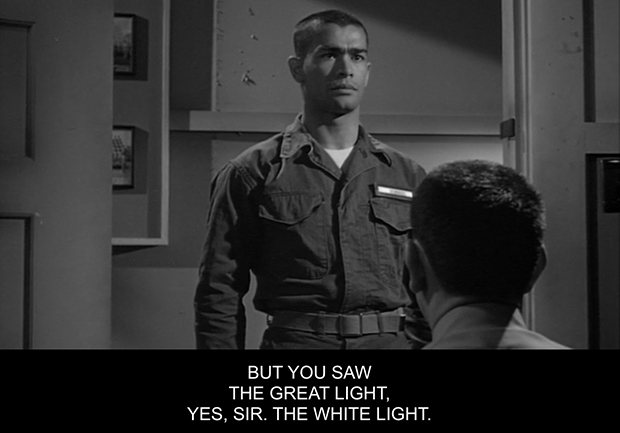
The question of the white light, the great light, isn't raised here in the film, though it is in the screenplay. Kubrick reserves it for later, and it isn't voice, it is instead suggested through a visual effect as Joker enters the head when he's on fire watch, the night after graduation.
When we were first introduced to the squad bay, there were 10 bunks on the starboard side, Cowboy and Joker being the 15th and 16th men in bunk 8, and Pyle the 19th in bunk 10 (reversed, Pyle would be the 2nd man, Joker the 5th and Cowboy the 6th). When Joker interfered with Hartman bullying Snowball, Pyle had been moved so he was occupying the next bunk down from Joker and Cowboy and it appeared that Joker and Cowboy were now in the last bunk on the starboard side. It appeared there were 10 lockers on that side, so Joker was the 20th man and Cowboy the 19th, both occupying bunk 10, while Pyle was the 17th man at bunk 9.
In the prayer scene, Pyle is the 13th man down on the starboard side, occupying bunk 7, and Cowboy and Joker are the 17th and 18th, occupying rack 9, and there are only 9 racks on that side (reversed, Joker is 1, Cowboy is 2, and Pyle is 6.)
As Joker initially was the 16th individual down on the starboard side, then, as Hartman went down the screenleft of the room from the opposite end, Snowball was the 16th individual down, with Hartman shifting the role of squad leader from Snowball to Joker in this scene highlights that a correspondance was drawn between them, though where Joker and Cowboy bunk have since changed.
Approx 17,700 words or 35 single-spaced pages.
Next: Full Metal Jacket Analysis - Part 2
Go to Table of Contents for Analysis of "Full Metal Jacket"
Link to the main TOC page for all the analyses